 Inflammaging: The Role of Inflammation in the Acceleration of Aging
Inflammaging: The Role of Inflammation in the Acceleration of Aging
As we age, our body starts to slow down, break down, and develop various symptoms, ailments, and diseases. We accept this as a fact without thinking much about it. One of the reasons for age-related symptoms and diseases is inflammaging, a low-grade inflammation that develops with advanced age.
Many don’t know, but you don’t have to accept symptoms of inflammaging as an unavoidable consequence of aging. It doesn’t have to be this way. You can live a vibrant and healthy life at any age. With proper nutrition and lifestyle strategies, you can slow the inflammaging process and reduce your risk of age-related symptoms and health issues.
In this article, you will learn what inflammaging is and what are its common symptoms. You will understand the top causes, the best lab tests and my top natural support strategies for inflammaging to improve your health and well-being through old age.
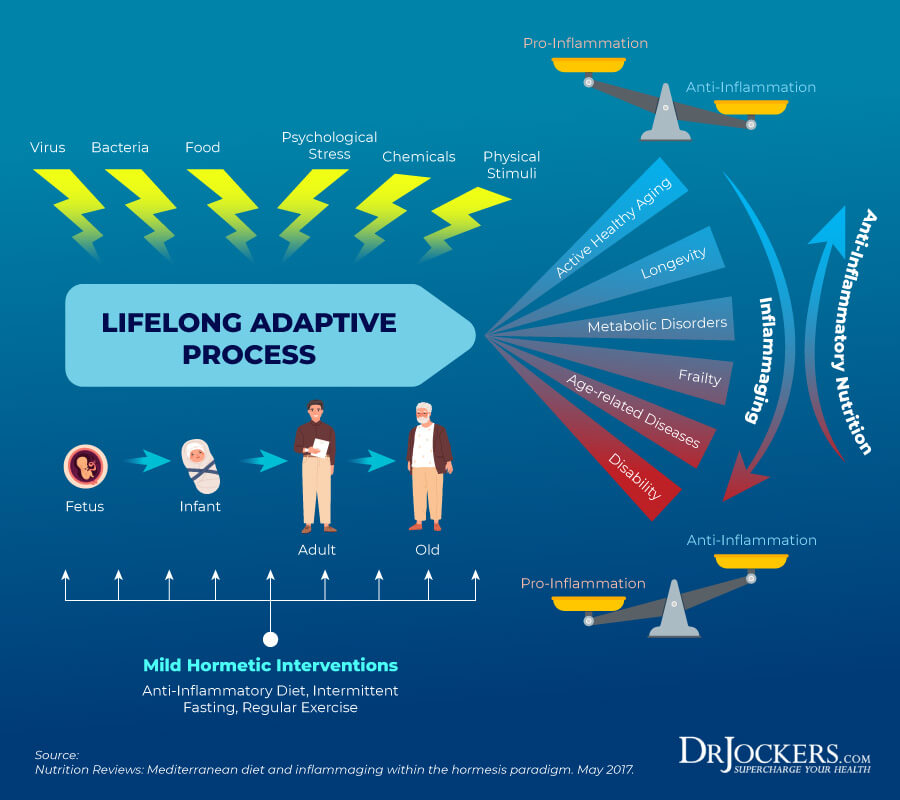
What Is Inflammaging
The term inflammaging, also known as inflamm-aging or inflamm-ageing, refers to an upregulated inflammatory response and a low-grade inflammation throughout the body that develop with advanced age. Inflammaging can accelerate the aging process and may worsen some age-related symptoms and diseases.
According to a 2013 study published in Longevity & Healthspan, inflammaging may be a consequence of the innate and acquired immune system that can increase inflammatory cytokine production in the body (1). Genetic, environmental, and age-related factors all play a role in your vulnerability or resilience to inflammaging and related symptoms.
These factors can play a role in promoting inflammation and cytokine production, decrease autophagy, increase obesity, and contribute to age-related health issues, functional decline, and mortality.
According to a 2018 review published in Nature Reviews Endocrinology, there are a variety of stimuli that can contribute to and sustain inflammaging, including pathogens, endogenous cells, misplaced molecules, gut microbiota, and nutrients (2). If receptors in your body sense these stimuli, they may activate innate immune responses that can drive metainflammation, a form of low-grade chronic inflammation caused by overnutrition.
A 2019 scientific review published in the International Journal of Molecular Sciences has pointed out an important connection between inflammaging and oxidative stress that may play a role in the development and acceleration of age-related and chronic diseases (3).
Among a variety of medication treatments stem cell therapy, the review also discussed the potential role of diet, plant supplements, and the gut microbiome in the potential treatment of inflammaging and related health issues. Later in this article, I will go over my top natural support strategies using these very same things – nutrition, supplementation, and gut health support – along with other natural lifestyle strategies.
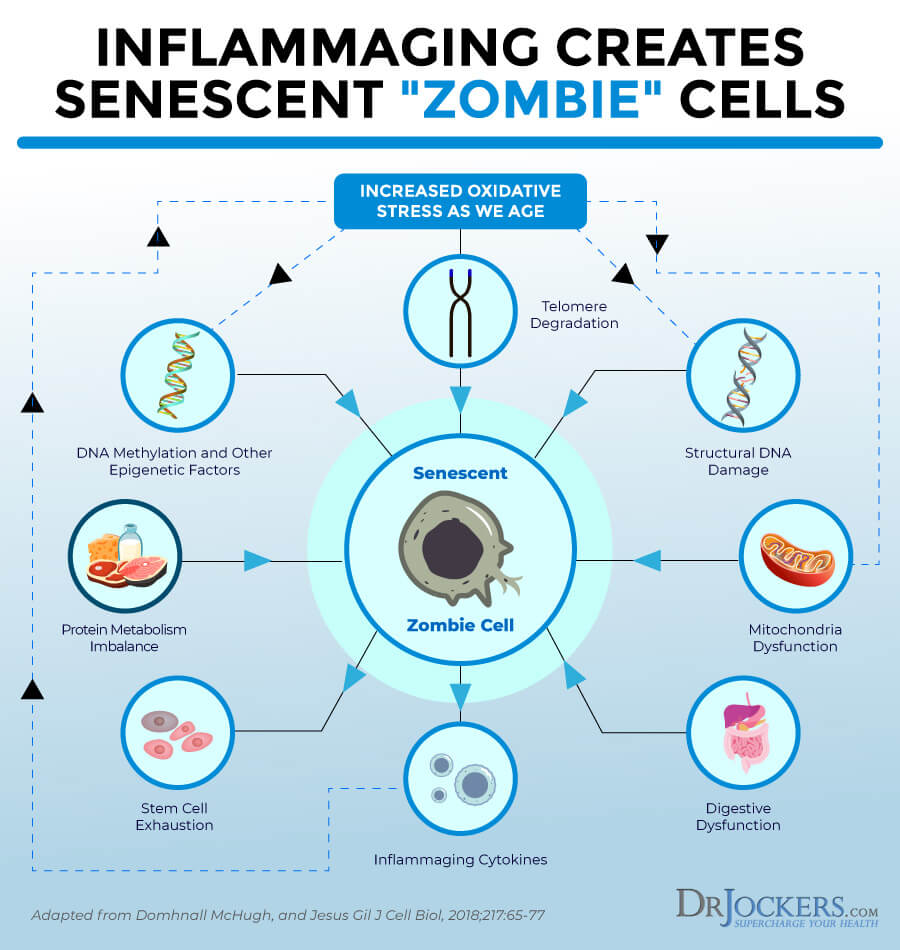
Signs & Symptoms of Inflammaging
When you age poorly, you create excessive oxidative stress within cells that damages the mitochondria and other cellular organelles and you create senescent or dysfunctional cells. Many researchers have nicknamed these dysfunctional cells “zombie cells,” because they resist death and cause massive problems within our body that accelerate our aging process.
Inflammaging can contribute to and accelerate a variety of symptoms. Common signs and symptoms of inflammaging include:
- Bone loss
- Muscle loss
- Weakness and loss of strength
- Weight gain and fat gain
- Memory problems
- Mood swings
- Brain fog
- Muscle and joint pains
- Body aches
- Chronic pain
- Digestive issues
- Blood sugar fluctuations
- Frequent illness
- Frequent injuries
- Fatigue
- Low energy
- Sleep troubles
- Looking or feeling older than you are
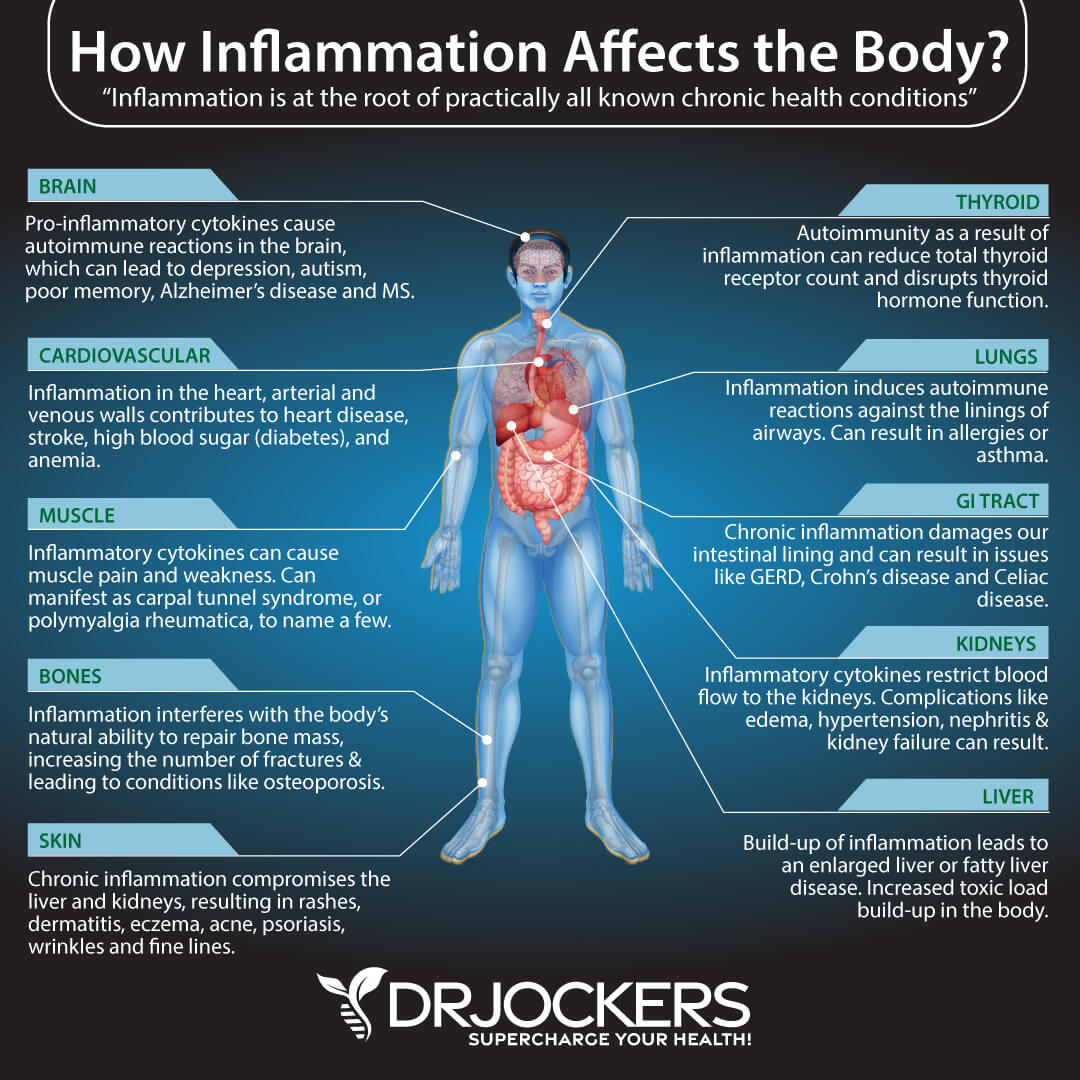
Root Causes of Inflammaging
Inflammation may develop because of a variety of reasons and usually as a result of all or several of these factors. Here are the top root causes of inflammaging
Eating Inflammatory Foods
As a 2018 review published in Nature Reviews Endocrinology explained, diet can play a major role in the development and treatment of inflammaging and related issues (2). Eating inflammatory foods, such as refined sugar, refined oils, gluten, artificial ingredients, conventional meat and dairy, food allergens, junk foods, and highly processed foods can increase inflammation and oxidative stress in your body and accelerate inflammaging, aging, chronic symptoms, and chronic health issues.
Inflammatory foods cause blood sugar imbalances, hormonal dysfunction and inflammation. You want to avoid these foods as much as possible to keep inflammation under control and age successfully.
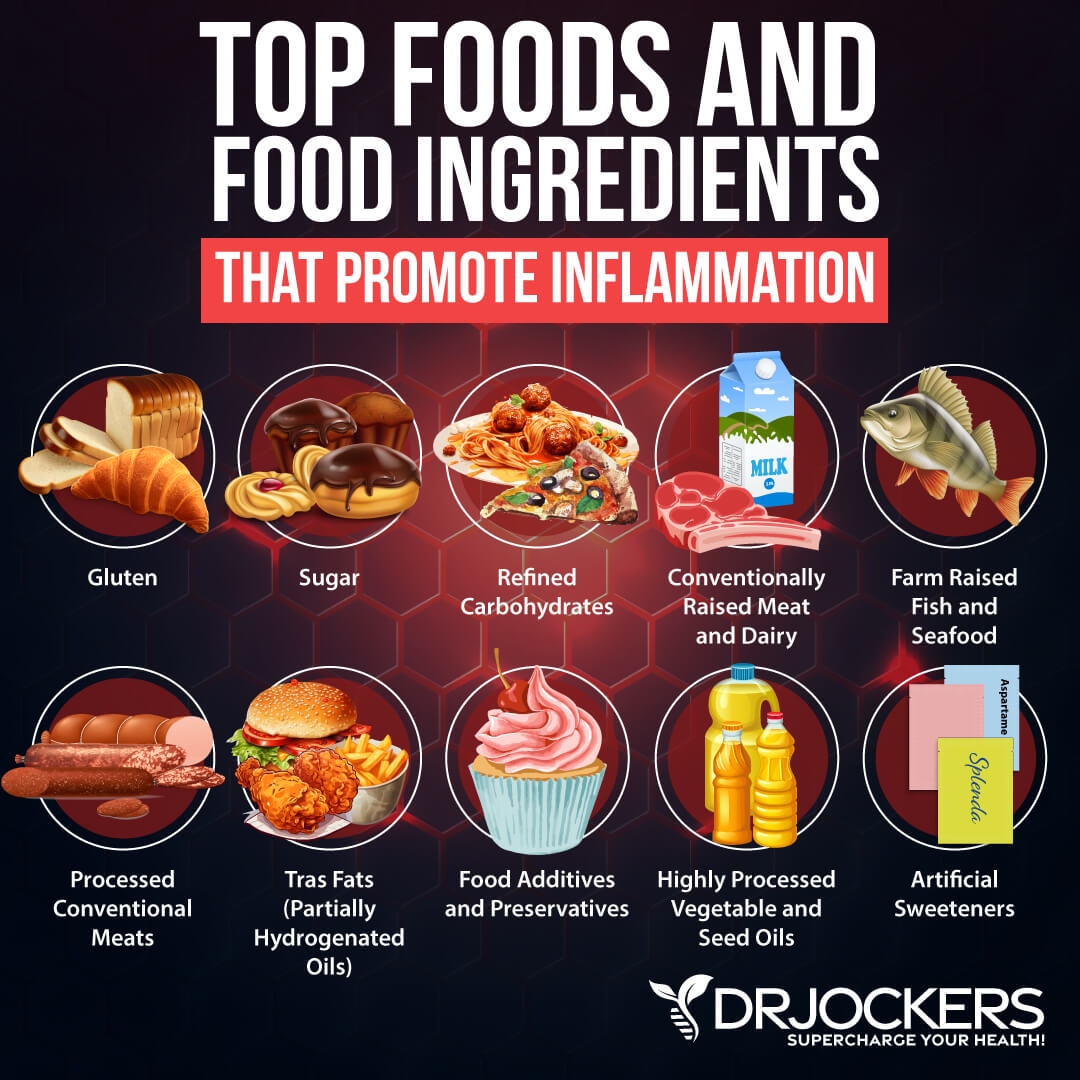
Blood Sugar Imbalances
Blood sugar imbalances are another reason that inflammaging may develop. As a 2016 study published in the Journal of Biomedical Sciences explained, the development of insulin resistance and increased inflammatory responses in your body may be interlinked (4). According to a 2005 study published in the Journal of Clinical Investigation, inflammation, stress, and diabetes are interlinked (5).
Advanced glycation end products (AGEs) are harmful compounds that develop when fat or protein combine with sugar in your bloodstream through glycation or also develop in foods through frying, grilling, or toasting at high temperatures. Unfortunately, our Standard American Diet (SAD) is high in AGEs, which according to a study published in the Journal of Clinical Endocrine Metabolism, increases the risk of obesity and metabolic diseases, which are of course linked to blood sugar and increase your risk of inflammation and age-related chronic diseases (6).
Overall, an unhealthy diet of sugar and fried foods can result in increased AGEs and blood sugar imbalances that can increase your risk of inflammaging and related health issues. To learn more about blood sugar imbalance and insulin resistance, I recommend reading this article.
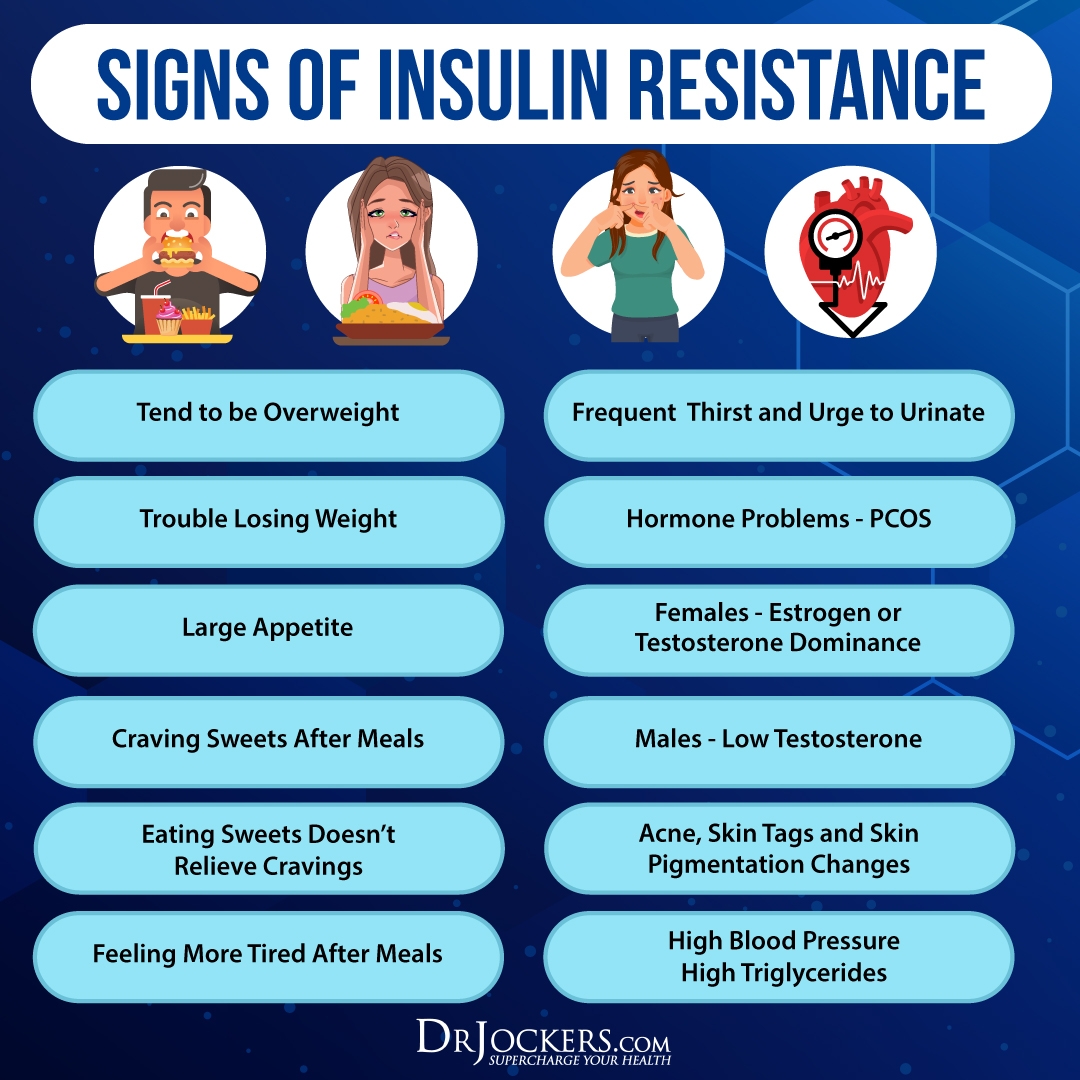
Leaky Gut Syndrome
Leaky gut syndrome refers to gut permeability. Eating an unhealthy diet, unhealthy lifestyle, toxin exposure, and other factors can damage the gut lining creating holes that allow bacteria, toxins, and undigested particles to pass through into your bloodstream creating inflammation, gut health issues, and other chronic health issues.
Leaky gut syndrome can also increase your risk of inflammaging. According to a 2019 study published in Geroscience, leaky gut syndrome can increase inflammation and lead to lower physical function, mobility limitations, and cardiometabolic disease in older adults (7).
According to a 2017 study published in Frontiers in Immunology, leaky gut syndrome can also lead to autoimmune diseases, which can progress with age and contribute to symptoms of inflammaging (8). To learn more about leaky gut syndrome, I recommend reading this article.
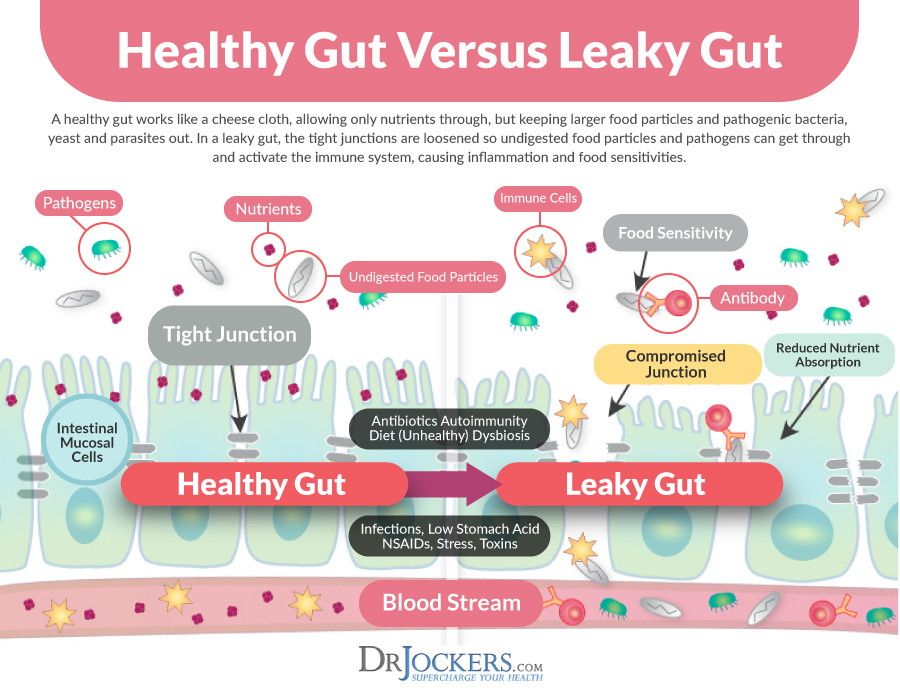
Chronic Stress & Poor Sleep Habits
Chronic stress, including physical, psychological, and emotional stress, is one of the top contributing factors to chronic inflammation and chronic health problems. While chronic stress can contribute to sleep troubles, poor sleep can certainly increase chronic stress and lower your resistance to stress, creating a vicious cycle.
A 2017 study published in Frontiers in Human Neurosciences explained that chronic stress is a common pathway to stress-related diseases (9). The risk of these diseases can increase with age. Chronic stress disrupts the homeostasis in your body. It increases chronic inflammation and can contribute to the development of atherosclerosis, non-alcoholic fatty liver disease, depression, and other stress-related chronic diseases.
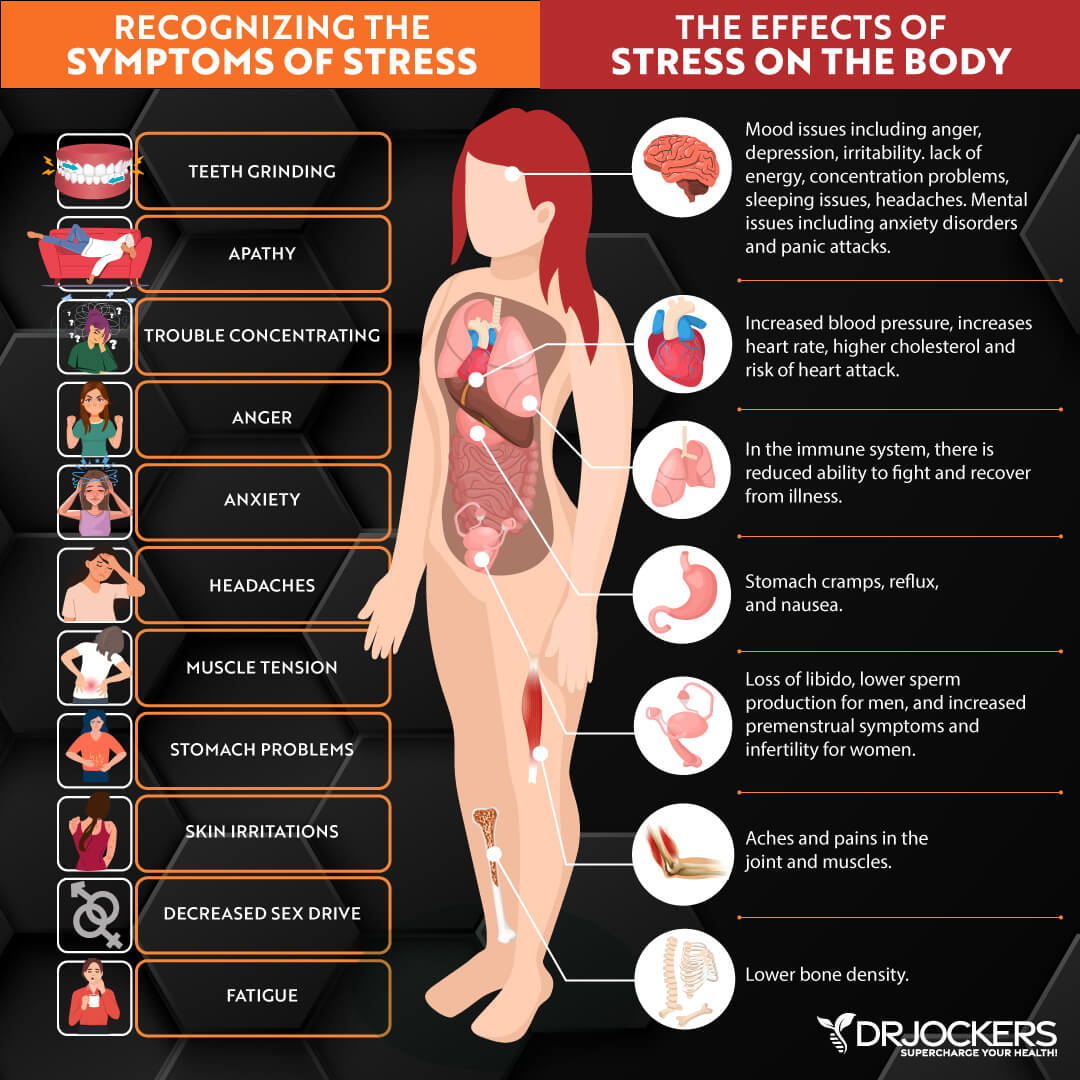
Environmental Toxins and EMF’s
Environmental stressors are huge contributing factors to inflammaging and related symptoms. Unfortunately, environmental toxins, including air pollution, water pollution, toxins in our tap water, plastic packaging, pesticides, herbicides, artificial ingredients in food, chemicals in conventional household and body products, and so on are part of modern-day life that can disrupt your body’s homeostasis and health causing inflammation, allergies, chronic symptoms, and chronic health issues.
EMF and 5G exposure can also cause similar disruption and contribute to memory loss, headaches, fatigue, cardiovascular stress, reduced immunity, and an array of health issues that are characterized by underlying chronic inflammation. All these environmental toxins are harmful, especially when you are bombarded with them on a constant basis.
They only increase inflammation, inflammaging, and related symptoms. As a 2015 study published in Carcinogenesis explains, environmental toxins can disrupt your immune system, increase inflammation, and increase the risk of cancer (10). To learn more about environmental toxicity and testing, I recommend reading this article. To learn more about the dangers of EMF exposure, I recommend reading this article.
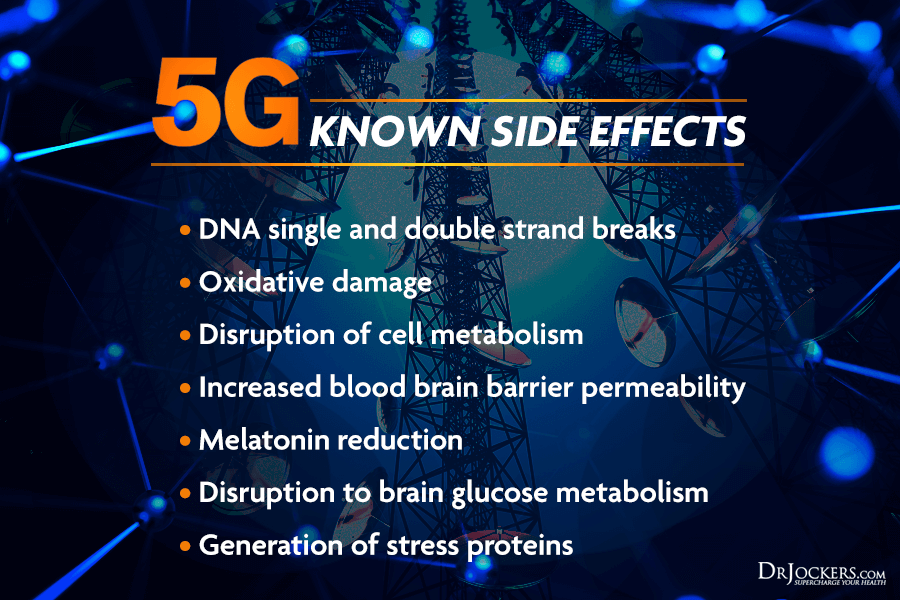
Chronic Infections
As a 2016 study Biogerontology, the ability of your immune system to protect your body making you more vulnerable to infections due to low-grade inflammation (inflammaging) and latent infections, such as cytomegaloviruses that can contribute to age-related diseases (11).
Chronic infections, including gut infection, Epstein-Barr Virus (EBV) infections, herpes virus infections, Lyme disease, Candida overgrowth, other fungal infections, and parasitic infections can all compromise your immune system and immune response, increase chronic inflammation and contribute to inflammaging, chronic symptoms, and chronic age-related diseases.
Oral infections can also be a major source of inflammation in the body. This includes untreated cavities and gum disease as well as hidden infections from root canals and dental cavitations.
To learn more about biotoxin illness, including viral and bacterial chronic infections, I recommend reading this article. To learn more about chronic Lyme disease, I recommend reading this article. To learn more about Candida overgrowth, I recommend reading this article. To learn about chronic viral infections, I recommend this article. For chronic parasite infections, read this article.
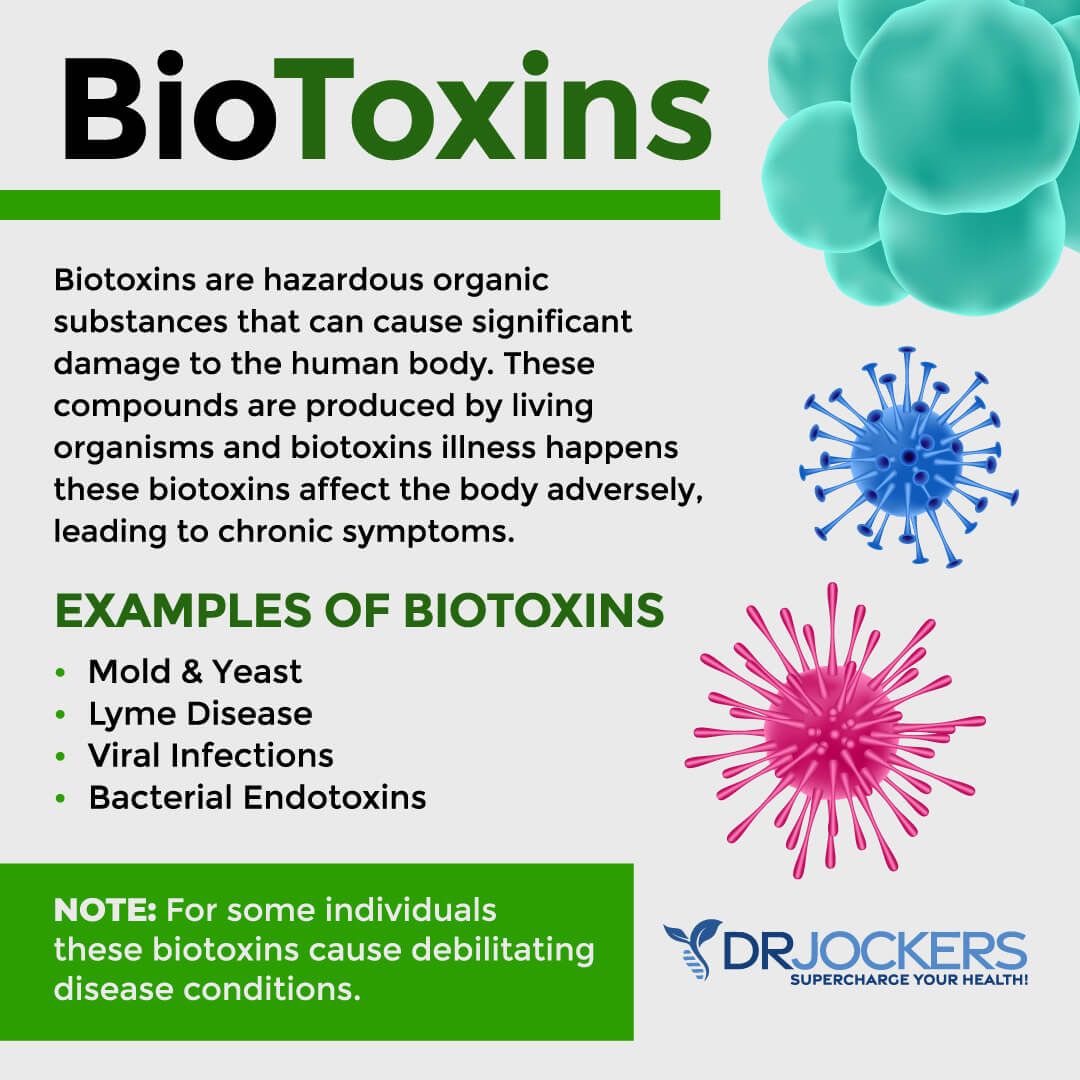
Nutrient Deficiencies
According to a 2018 review published in Nature Reviews Endocrinology, there are a variety of things that can contribute to inflammaging and one of the major factors may nutrient deficiencies (2)
Vitamin D
Vitamin D is a very important nutrient that is essential for your muscles, bones, teeth, brain, and immune system. A 2017 mini review published in the European Journal of Clinical Nutrition has found that vitamin D deficiency can contribute to low-grade systemic inflammation associated with aging and three randomized clinical trials have shown that vitamin D supplementation can lead to an improvement in this inflammation (12).
A 2016 study published in Nutrients has also found that vitamin D can improve inflammation in older individuals (13). To learn more about vitamin D deficiencies, I recommend reading this article. Optimal 25-OH vitamin D levels should be between 50-100 ng/ml.

B Vitamins
B vitamins are essential for cellular health, energy levels, brain function, mental health, nerve function, and digestion among other areas of your health that tend to decline with age and through inflammaging. According to a 2010 study published in the European Journal of Clinical Nutrition, vitamin B6 supplementation may help to improve inflammation in those with rheumatoid arthritis, a condition that can progress with aging (14).
A 2016 review published in Nutrients has found that vitamin B is important for brain health, which is an area that can be highly affected by inflammaging and the aging process (15). To learn more about vitamin B deficiencies, I recommend reading this article.

Omega-3s
Omega-3 fatty acids found in fish, seafood, algae, hemp seeds, chia seeds, and flax seeds are healthy fats that are known to have anti-inflammatory benefits. They can help to create an omega 3-6-9 balance in your body to reduce inflammation and enhance recovery from health issues.
According to a 2016 study published in Nutrients, omega-3 fatty acids can help to improve inflammation in older individuals (13). Another study from 2019 published in Aging Clinical and Experiential Research has found that omega-3 supplementation can target inflammaging and benefit the prevention and treatment of sarcopenia, a geriatric syndrome affecting the older population (16). To learn more about the importance of omega-3s, I recommend reading this article.
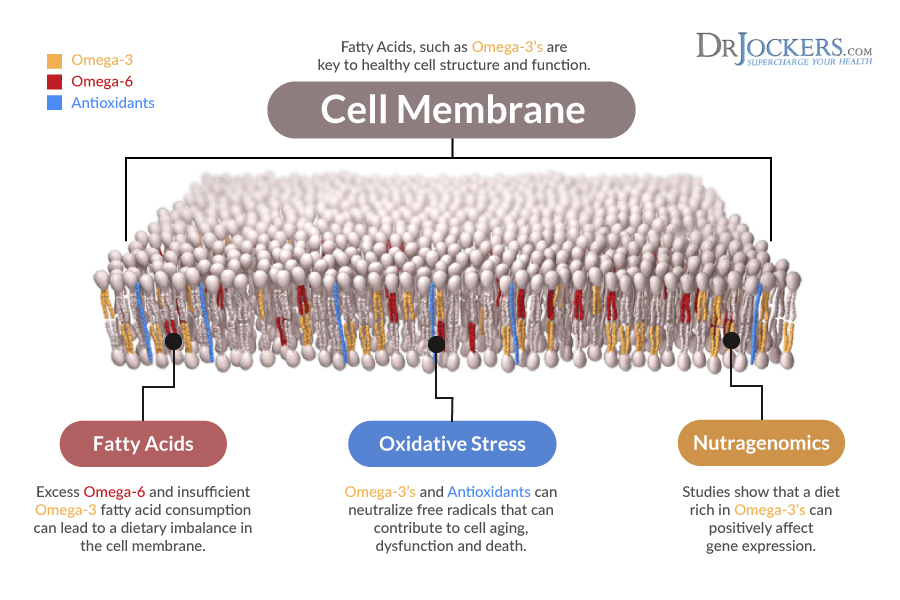
Zinc
Zinc is a mineral that’s incredibly important for your immune system and metabolic function. According to a scientific paper published in Pathobiology in Aging & Age-Related Diseases, zinc deficiency is quite common in the elderly population and can contribute to oxidative inflammatory aging and the gradual deterioration of the immune system with age (17).
Furthermore, a 2019 study published in Mechanisms of Ageing and Development, has discussed the importance of zinc as well as a healthy copper to zinc ratio in relation to aging and health (18). To learn more about the importance of zinc and the problems with zinc-copper imbalance, I recommend reading this article.
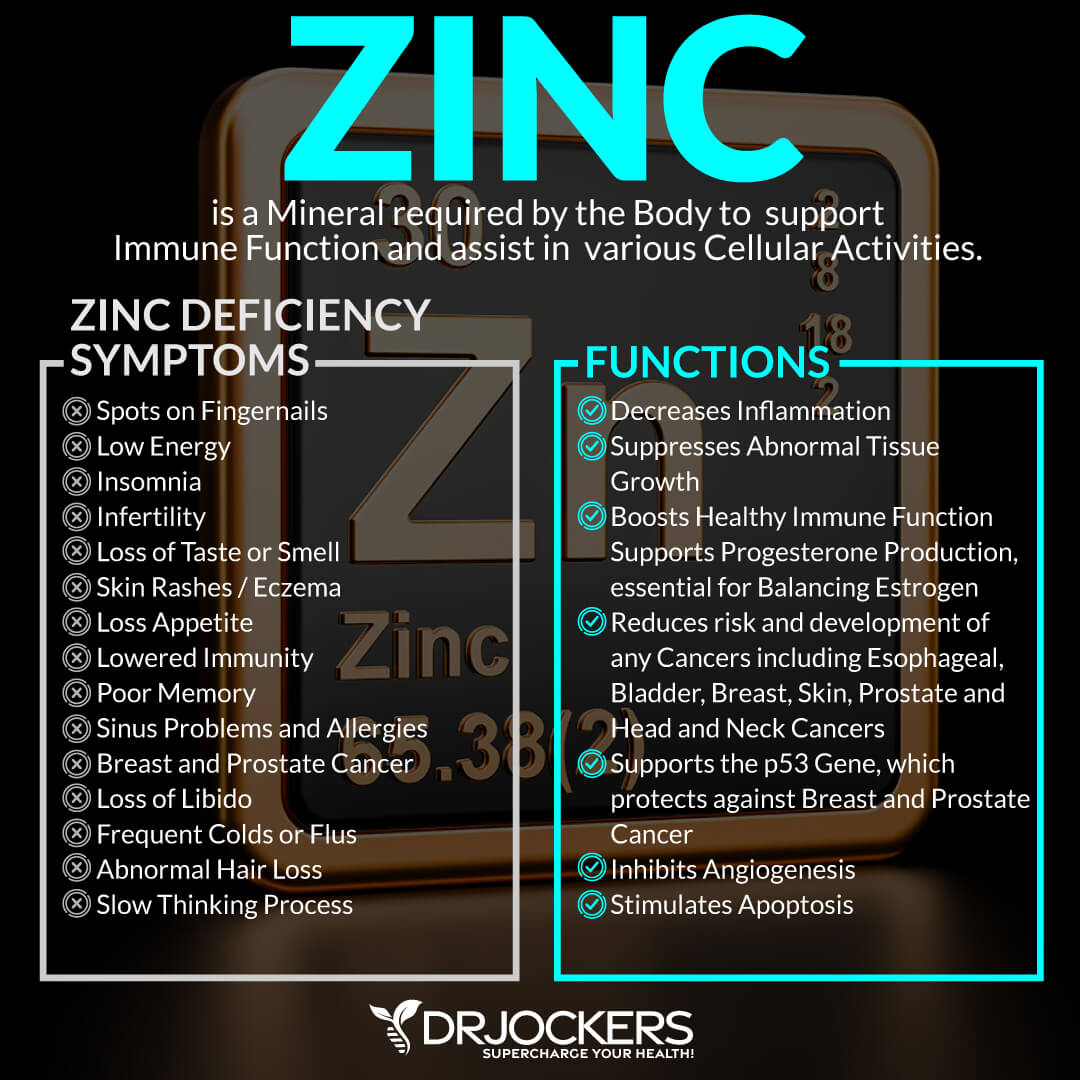
Glutathione
Glutathione is a potent antioxidant that’s important for cellular function and preventing oxidative stress. A 2016 study published in the Journal of Nutrition reduced glutathione may play a role in inflammaging and age-related skeletal muscle-wasting and strength loss (4).
A 2019 scientific review published in the International Journal of Molecular Sciences has found similar results and that glutathione may be helpful for inflammaging and oxidative stress in relation to the development and acceleration of age-related and chronic diseases (3). To learn more about glutathione, I recommend reading this article.
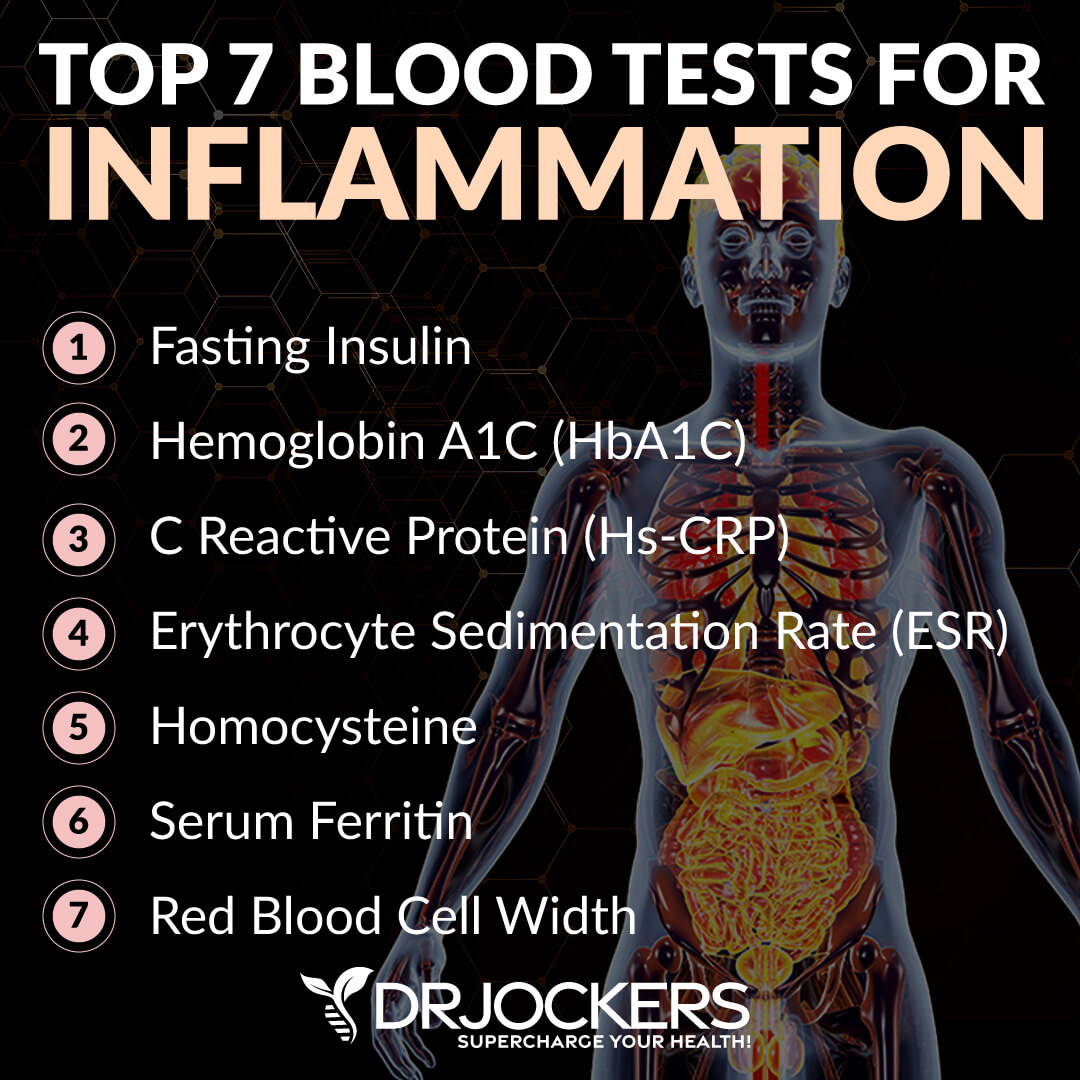
Best Labs to Review for Inflammaging
If you have any symptoms of or at risk of inflammaging, I recommend a variety of lab tests to review.
Fasting Insulin & HbA1C
Since blood sugar imbalances are one of the main causes of inflammaging, I recommend checking your fasting insulin and HbA1C levels. Testing your fasting insulin can recognize elevated blood sugar levels and can detect inflammation, insulin resistance, blood sugar issues, and diabetes.
The clinical range for fasting insulin is 2.6 – 24.9 uIU/ml and the optimal range is 1.0 – 5.0 uIU/ml. Hemoglobin A1C (HbA1c) gives the average amount of glucose in your blood or blood sugar over the past 3 months making it one of the top tests for inflammation and diabetes. The clinical range is between 4.8 and 5.6 while the optimal range is 4.5 – 5.2.
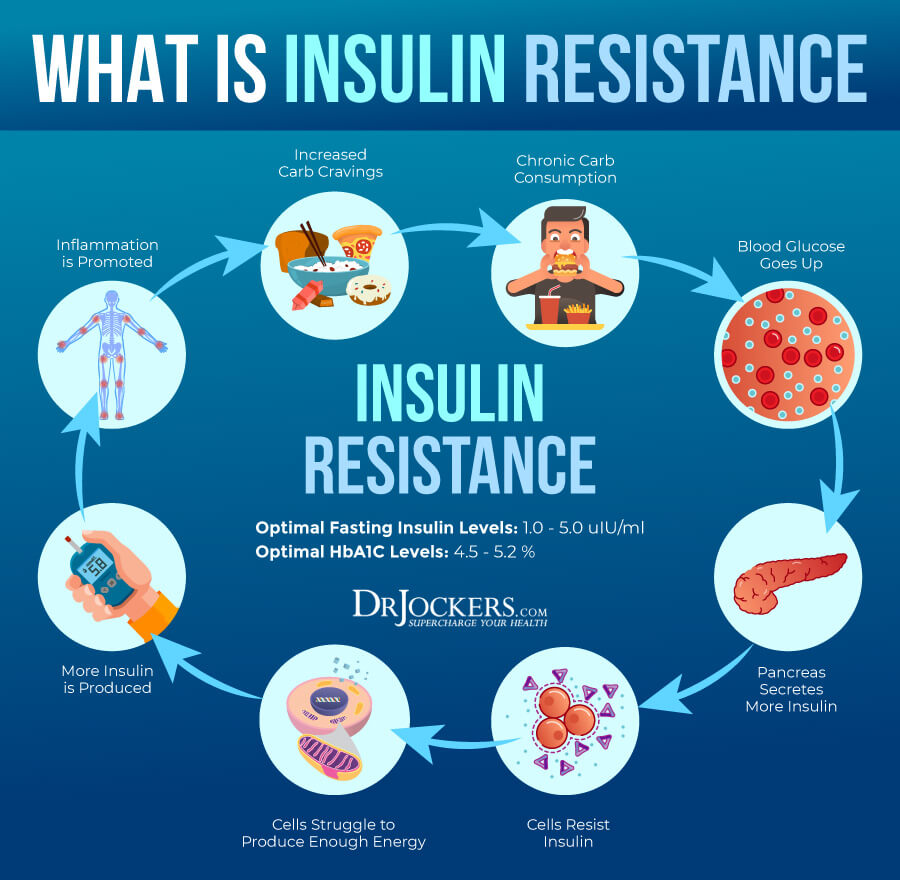
Hs-CRP
The C-Reactive Protein or CRP test is a blood test that measures a protein (CRP) produced in the liver to assess inflammation levels in your body. According to a 2013 study published in Rheumatology, elevated levels of CRP may be associated with muscle strength weakness in knee osteoarthritis, a common problem in older people (20).
The clinical range is between 0 and 3 mg/L while the optimal range is 0 to 1 mg/L. When I see levels over 1 mg/L, I know the individual is having an inflammatory response that could be due to acute trauma or chronic conditions.
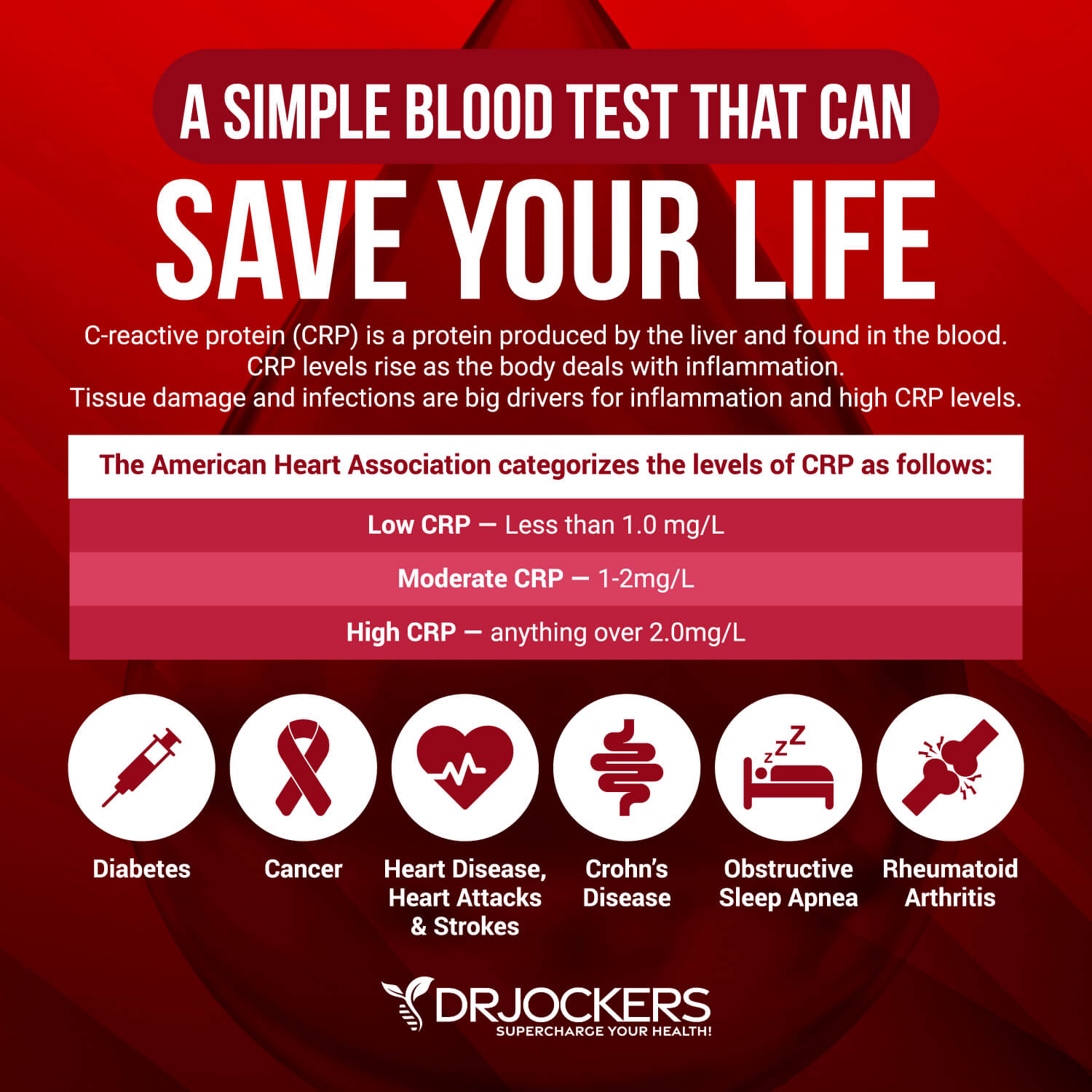
Erythrocyte Sedimentation Rate
The erythrocyte sedimentation rate is the rate at which your red blood cells in anticoagulated whole blood drop in a standardized tube over one hour. This is a great test to measure inflammation.
When our bodies are inflamed, the blood sticks together and it slows the sedimentation rate down. Anything over 20 mm/hr is a sign of significant inflammation and optimal results should be under 10 mm/hr.
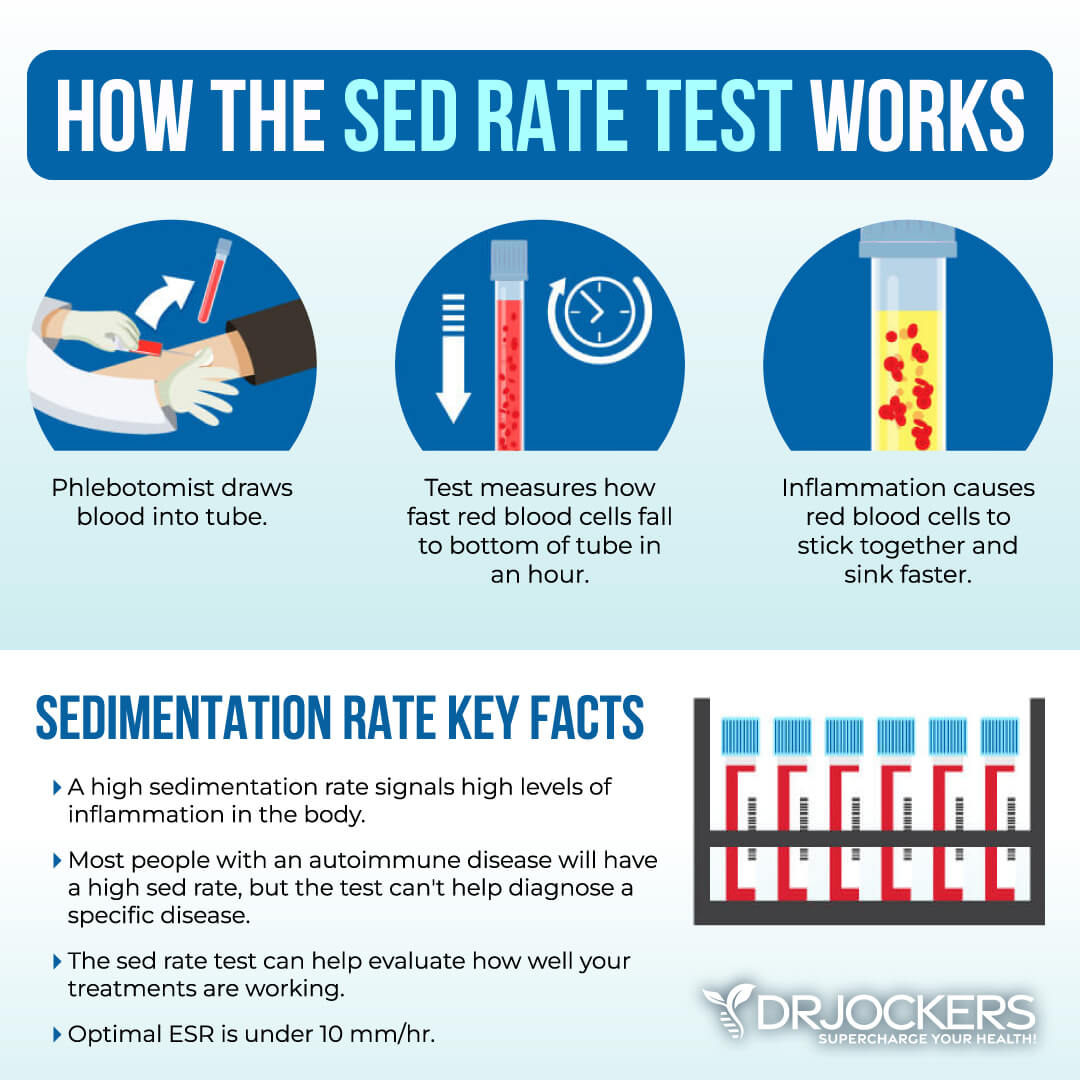
Serum Ferritin
Serum ferritin is a simple blood test that measures the level of ferritin in your body. It can detect iron deficiency anemia and all kinds of issues. Elevated levels may indicate inflammation, liver disease, autoimmune disorders, or even cancer.
According to a 2012 study published in the European Geriatric Medicine, increased ferritin levels may be associated with age-related inflammation and underlying iron deficiency in the elderly population (21). The clinical range is 30 to 400 and the optimal range is 25 to 100 for females and 50 to 150 for males.
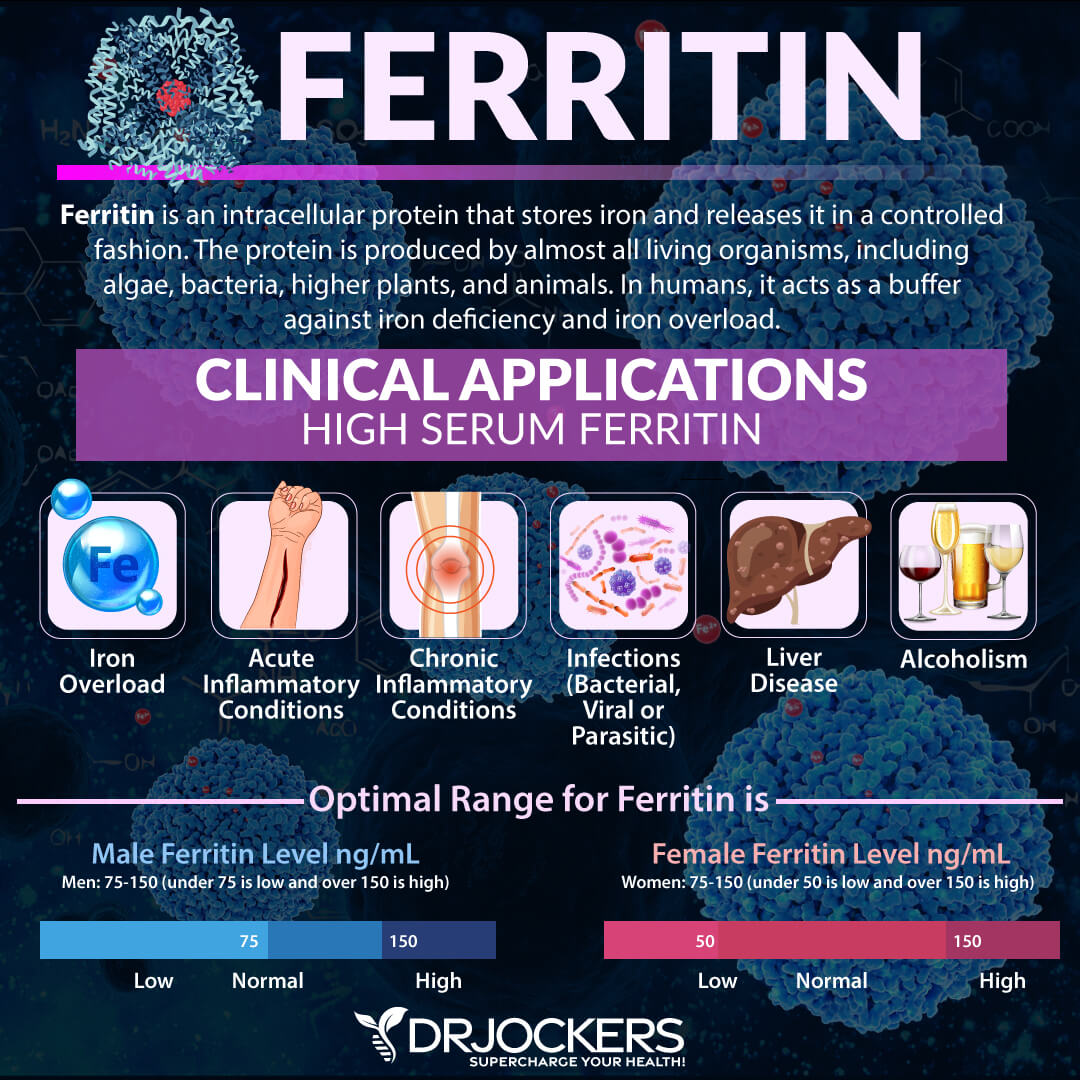
Red Blood Cell Width
Red Blood Cell Distribution Width (RDW) is a great test to detect underlying inflammation in your body. The size of your red blood cells has a lot to do with maturation and it is dependent on methylating agents such as vitamin B12 and folate.
According to a 2018 study published in Science Reports, elevated RDW levels may be associated with sarcopenia, a common issue in older people with inflammaging (22). The clinical range is between 12.3 and 15.4 percent while the optimal range is 11.5 and 13 percent.
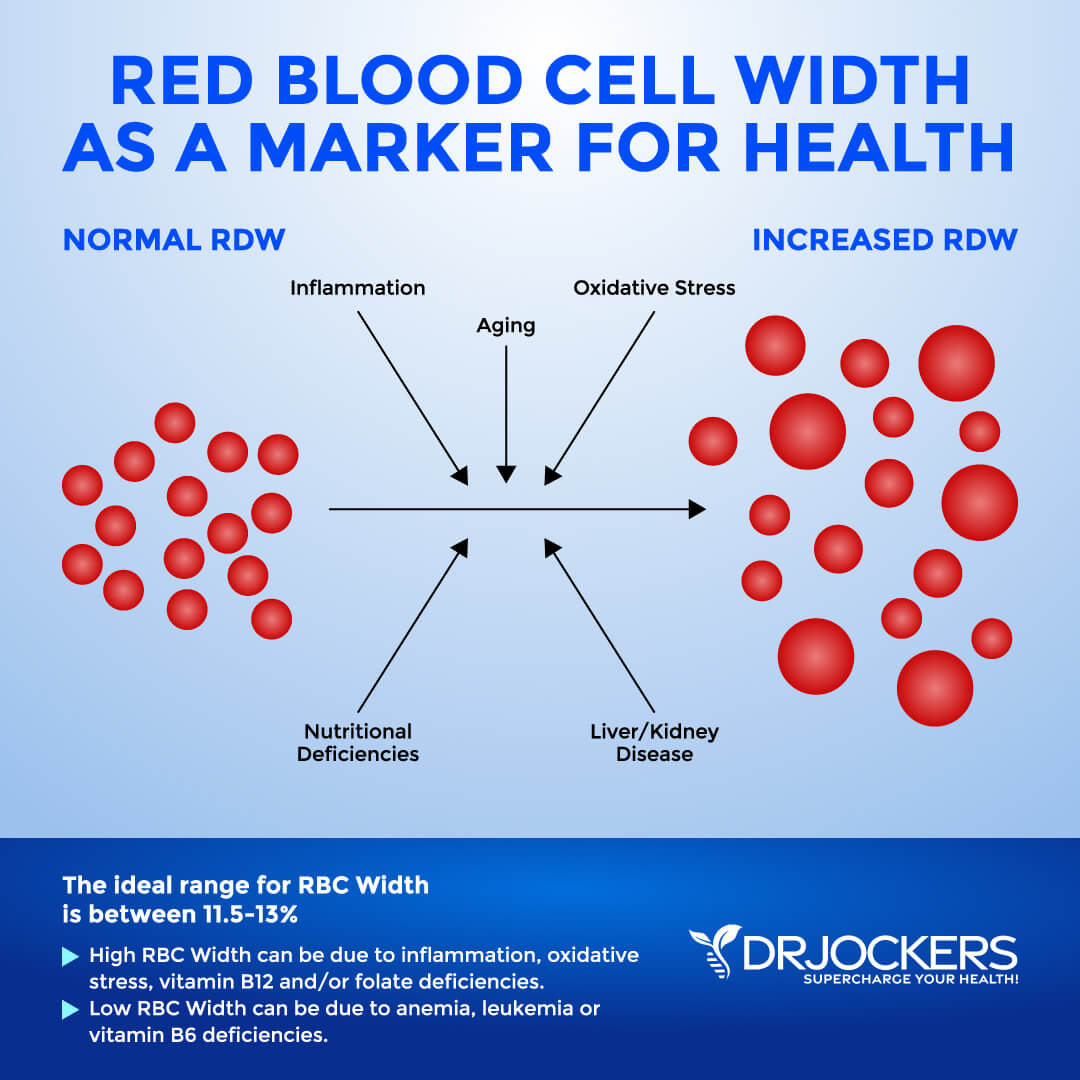
Comprehensive Blood Analysis
To check for these health markers, I recommend a Comprehensive Blood Analysis (CBA), which is a very detailed blood test that looks at all of these markers of inflammation. This test is more sophisticated than most conventional doctors run.
It examines all parameters for inflammation, blood sugar levels, thyroid function, zinc and copper ratio, vitamin A and D levels, a complete metabolic panel, complete blood count, liver function, nutrient deficiencies, and more. I recommend getting the Comprehensive Blood Analysis done regularly both as a preventative measure and to monitor your inflammation levels and progress if you are on a treatment plan.
Natural Support Strategies
When it comes to inflammaging, prevention, slowing the progress of the inflammation, and reversing the issue are all equally important. For that, it is important to consider a variety of nutritional and lifestyle factors that can affect inflammation and symptoms in your body. These are the top natural support strategies I recommend for inflammaging:
Anti-Inflammatory Nutrition Plan
If you are dealing with inflammaging, inflammation, chronic symptoms, or chronic health issues, or looking to prevent them, addressing your nutrition is always number one. I recommend an anti-inflammatory nutrition plan for inflammaging. Eliminate all inflammatory foods, such as refined sugar, refined all, conventional meat and dairy, gluten, food sensitivities, artificial ingredients, junk food, and processed food.
Follow an anti-inflammatory nutrition plan full of whole foods, including greens, vegetables, herbs, spices, low glycemic index fruits, healthy fats, fermented food, and clean animal protein. Make sure to hydrate your body with clean purified water. To learn more about the ketogenic anti-inflammatory nutrition plan I recommend, read this article.
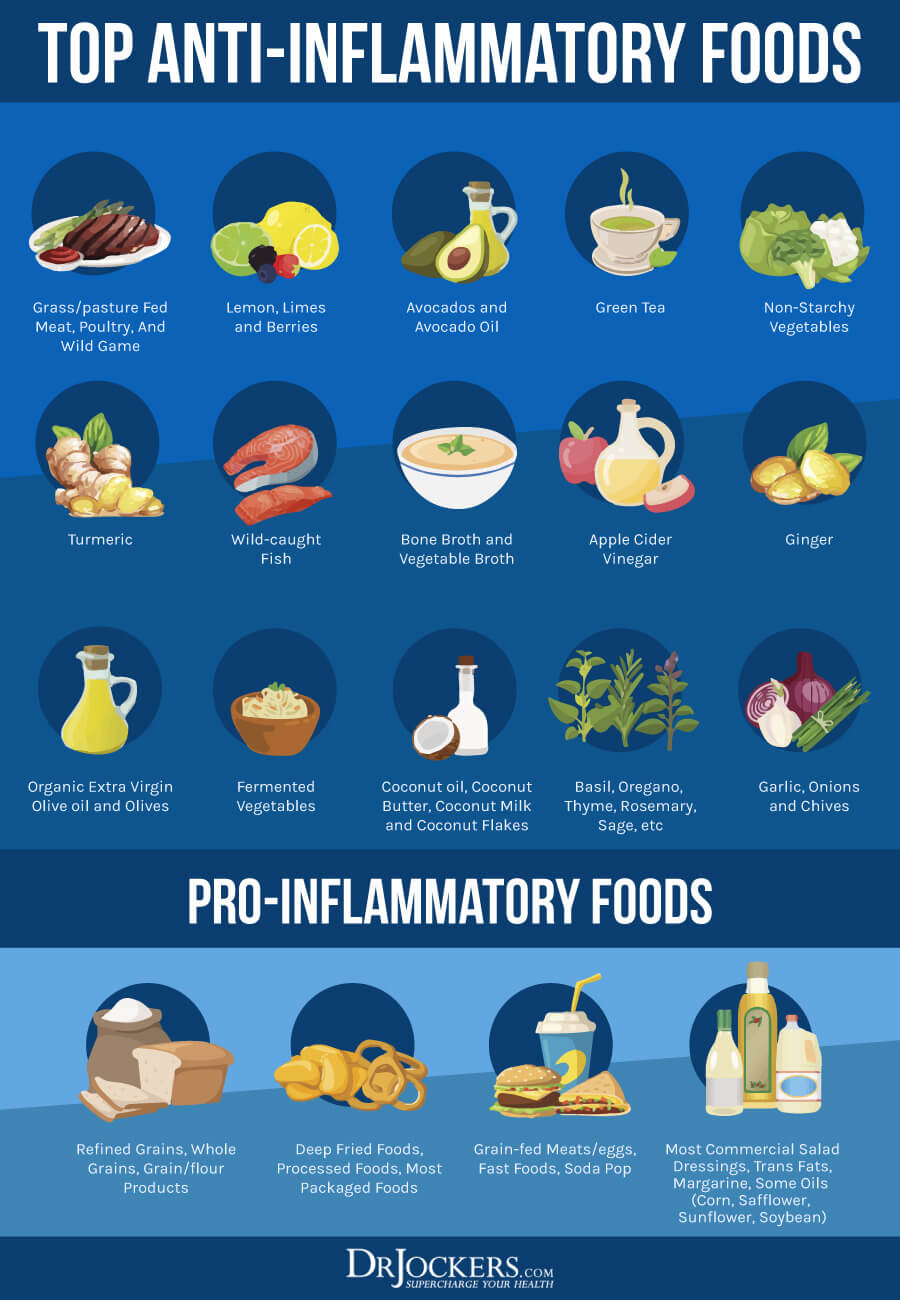
Consider Getting into Ketosis
Under normal circumstances, your body relies on glucose to get energy. However, if your body is deprived of dietary glucose due to fasting or a high-fat ketogenic diet, it starts using fat instead, it gets into ketosis and becomes fat adapted. This is a much more efficient way to be than relying on glucose.
Ketosis offers similar health benefits as intermittent fasting, including cellular autophagy, reduced inflammation, improved blood sugar levels, and reduced risk of ketosis. This is not surprising since the best ways to achieve ketosis are fasting and a ketogenic diet. The best is to combine a ketogenic diet with intermittent fasting for ultimate benefits. To learn more about ketosis, I recommend reading this article.
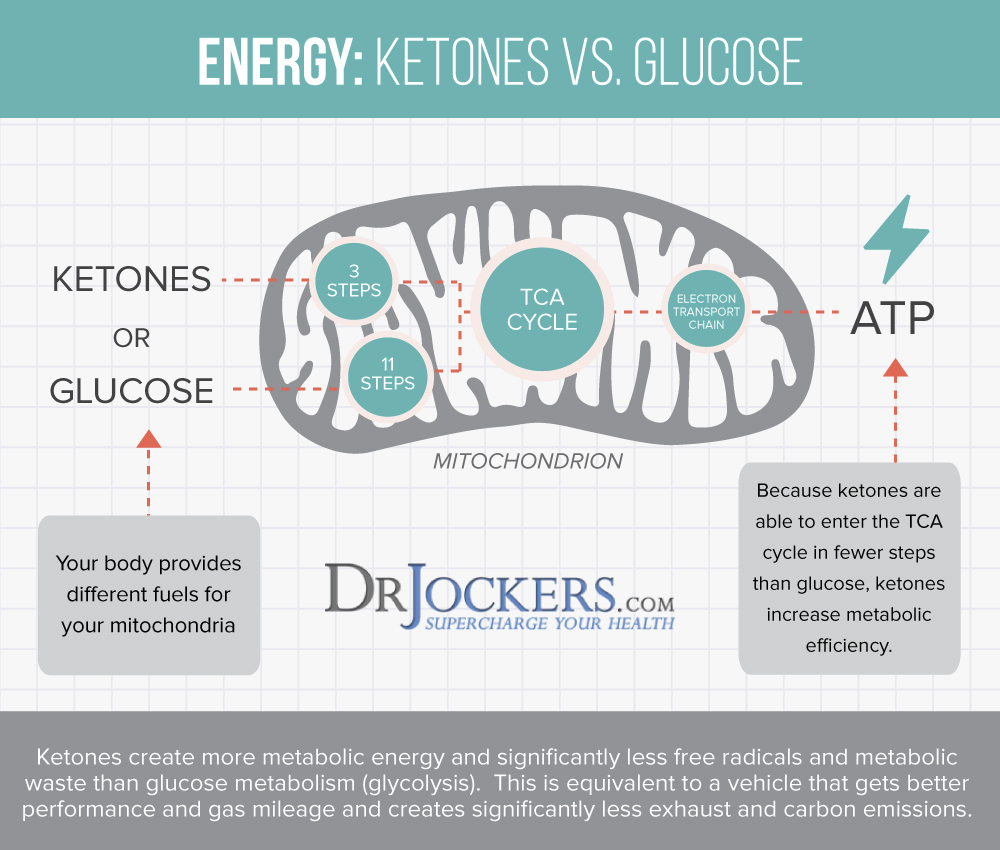
Intermittent Fasting
Intermittent fasting is a great way to reduce inflammation, improve insulin resistance, support cellular autophagy, and reduce your risk of chronic symptoms and health issues. Intermittent fasting is a way of eating when you are cycling between periods of fasting or feasting.
If you are new to this strategy, begin with 12 hours of fasting, including your overnight sleep. For example, if you eat dinner at 6 pm, stop eating after 12 hours, and you will be ready to eat again at 6 am the next day. Increase your fasting period over time. You will notice that delaying breakfast until 7 am, 8 am, or even 10 am will come naturally to you over time. Most people feel the best with 16 hours of fasting a day. To learn more about intermittent fasting, I recommend reading this article.
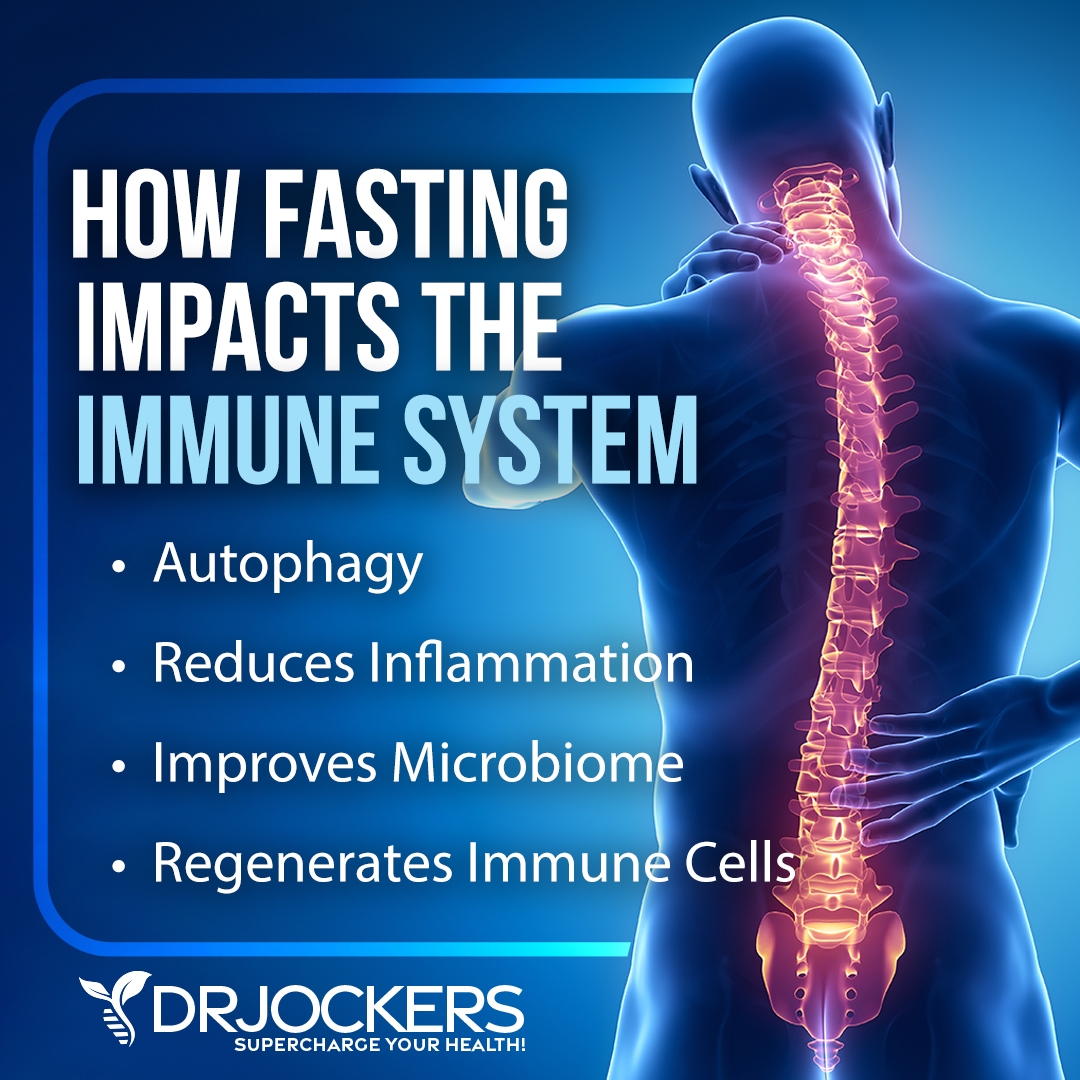
Reduce Stress & Improve Sleep Quality
Stress and poor sleep play a huge role in your health and chronic stress and poor sleep can contribute to inflammaging and health issues. I recommend that you practice meditation, breathwork, muscle relaxation strategies, gratitude, journaling and prayer. Spend time in nature as often as possible as well to reduce stress and improve your sleep quality.
Seek support and uplifting activities with friends and family. Develop a relaxing bedtime routine that works for you. Follow a regular sleep schedule that supports your body’s circadian rhythms. Invest in a supportive bed and comfortable bedding and pillows. Make sure to sleep 7 to 9 hours a night. To learn more about the best strategies to improve sleep quality, read this article.

Regular Movement & Exercise
Moving your body regularly can help to reduce inflammation and improve your symptoms. Begin your day with stretching, some yoga moves, a short walk outside, or a trampoline session. To stay active throughout the day, get up and stretch regularly, go for a walk during lunch, dance to your favorite song, bike or walk instead of driving short distances, take the stairs, park your car far from the store and walk to the door, play with your kids, or walk your dog.
Exercise at least 3-5 days a week for 20 to 30 minutes each time doing whatever you enjoy the most. I also recommend getting a few days a week of resistance training to strengthen your body and add in some cardiovascular exercise such as walking, jogging, dancing, etc. to get your heart rate up a bit as well.
You may also enjoy low intensity movements such as stretching, Pilates or yoga. While regular movement and exercise are important, it is critical that you are not overtraining and that you are fueling your workouts with proper anti-inflammatory nutrition and get enough rest and sleep.
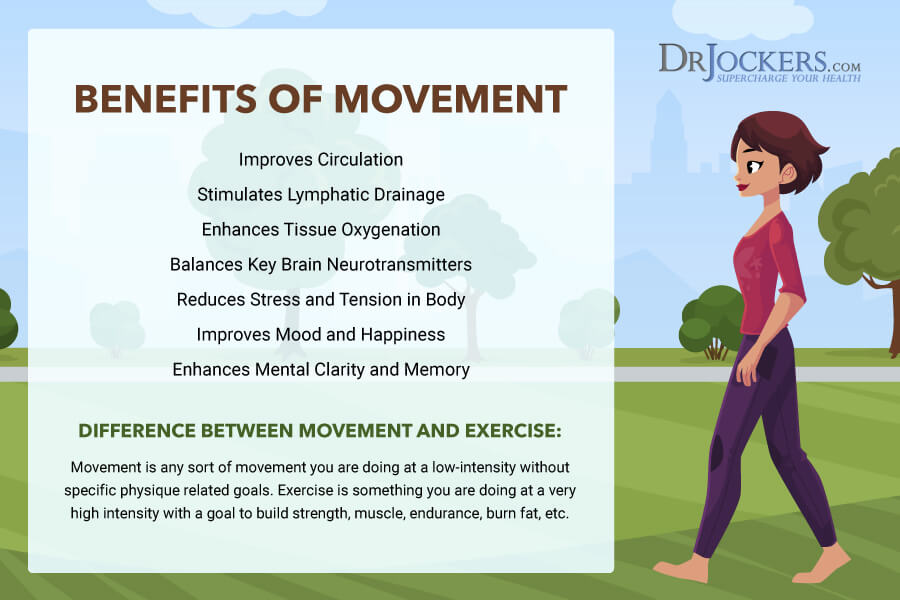
Heal Your Gut & Improve Microbiome
A poor microbiome and an unhealthy gut is the recipe for inflammation, inflammaging, and related symptoms. While following an anti-inflammatory nutrition plan is critical, it can also be important to support your body with probiotics and eating prebiotic-rich foods. Experiment to find the right amount of prebiotics for your body type.
Some people thrive on a prebiotic rich diet while others get worse and need to minimize prebiotics by following a low-FODMAP diet or even a carnivore diet for a period of time. Try out a high prebiotic diet and see if you feel better and if not, try a low-FODMAP or carnivore diet and see if that helps you feel better.
Probiotics are healthy bacteria that help to improve your gut microbiome, reduce chronic inflammation, and lower the risk of leaky gut. Prebiotics are fibers found in specific plant foods that help to feed the probiotics.
If you are dealing with any chronic infections that may affect your gut health, talk to your functional health coach, like my team, to help you address them through appropriate herbal supplementation and diet. To learn about gut dysbiosis, I recommend reading this article. From this article, you may also learn about the GI Map Analysis that can help to detect underlying gut infections and microbiome issues.

Open Up Detoxification Pathways
Improving your detoxification pathways is very important to reduce inflammaging and cleanse your body from toxin build-up. Your detoxification or drainage pathways include your lymphatic system, your skin, liver, kidneys, colon and respiratory system.
To open these pathways up, it is important to drink lots of clean, purified water, have regular bowel movements, practice deep breathing, exercise and sweat. A great strategy to enhance these pathways is activating more respiratory patterns and deep sweating by exercising and using an infrared sauna. You can learn more about infrared sauna therapy from this article.
Support lymphatic health and detoxification through dry brushing and rebounding. You can improve liver and kidney health through good hydration and taking bitter herbs such as parsley, milk thistle, cilantro, dandelion, celery and ginger. Here is an article on how to do a 7-day liver cleanse.
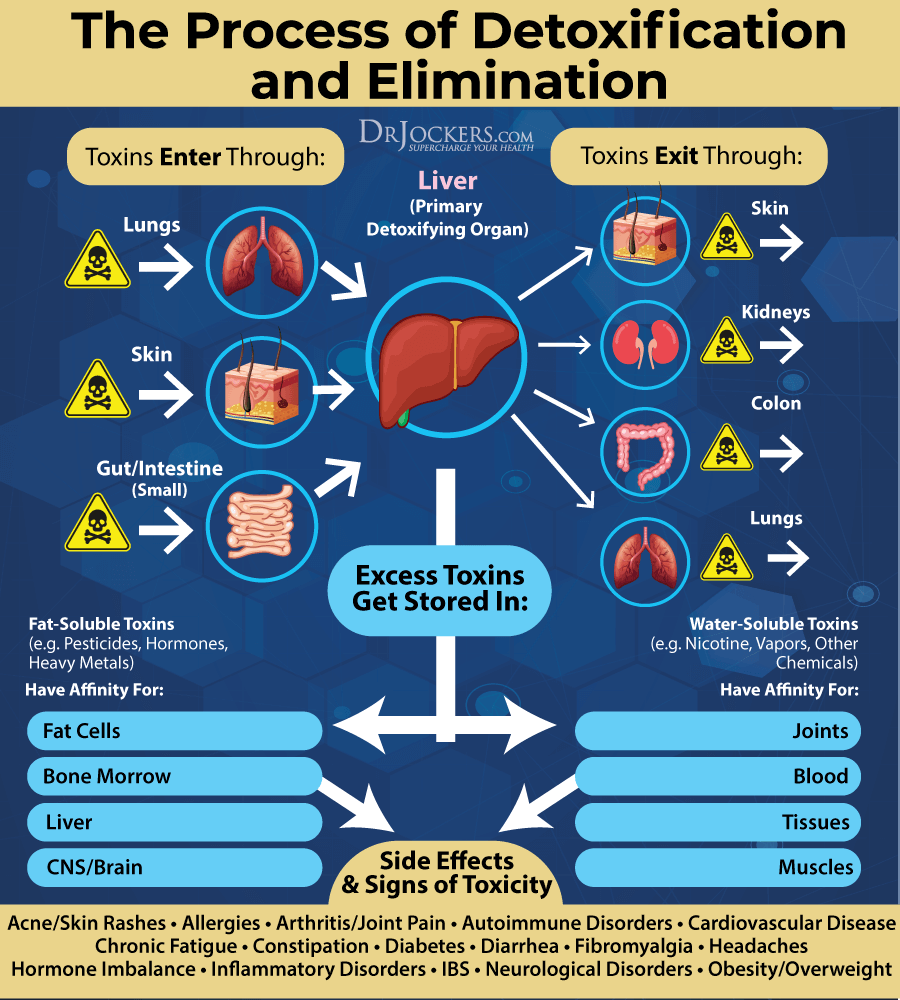
Limit EMF Exposure
EMF exposure can increase inflammation and disrupt the natural homeostasis in your body and may lead to a variety of issues. To reduce EMF exposure I recommend that you:
- Keep your phone and other devices off or on airplane mode as much as possible.
- Use hard-wire internet connections instead of WiFi whenever you can.
- Limit your WiFi use to the minimum.
- Turn off your WiFi router at night or when not in use.
- Use hard-wire computer peripherals instead of wireless or Bluetooth as much as possible.
- Make sure that the electrical wiring in your home is done properly and correct any potential issues.
- Keep your cell phone, computer, and other devices as far as from yourself when you are not using them.
- Keep your cell phone and other devices out of your bedroom, your children’s room, or wherever you rest.
- Sleep as far as possible from circuit breakers or large appliances that are running overnight.
- Use dirty electricity filters to filter out dirty electricity.
- Choose landlines or face-to-face contact over cell phone or online contact whenever possible.
- Minimize your electronics use and do regular digital detoxes.
- Wear a Harmoni Pendant.
To learn more about the dangers of EMF exposure and preventative strategies, I recommend reading this article.

Optimize Vitamin D Levels
Low vitamin D levels may increase inflammation, inflammaging, and related symptoms. It is essential that you spend time outside in the sun and eat vitamin D-rich foods such as oily fish, liver, and egg yolk to increase your vitamin D levels.
Unfortunately, however, this alone is usually not enough for optimal vitamin D levels. Typically taking 1,000 IU per 25 lbs. of body weight will help you get your levels into a healthy range.
You want to test your vitamin D levels at least 1-2 times each year and get your levels between 50-100 ng/ml. It has been hypothesized that a therapeutic level for various health conditions is going to be between 70-100 ng/ml. I recommend taking a daily vitamin D supplement with vitamin K2 to improve absorption, such as Vitamin D3/K2 Power.
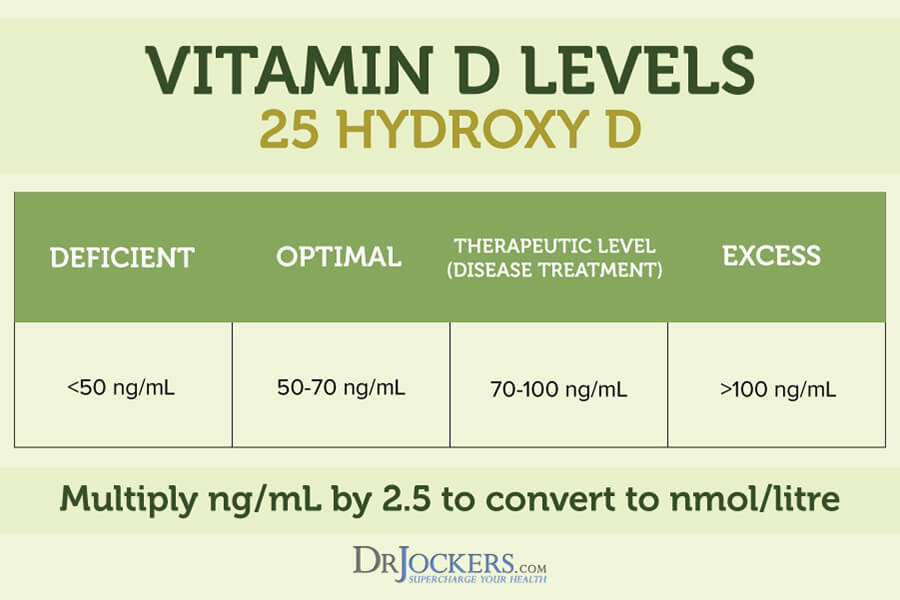
Optimize Omega-3 Levels
Omega-3 fatty acids are one of the most foundational supplements for mitigating inflammation. Most people today are consuming highly processed diets that are high in omega-6 fats and deficient in omega-3. This imbalance alone contributes to higher levels of inflammation as omega-6 fats are involved in the eicosanoid pathway (responsible for producing inflammation).
By increasing your ratio of omega-3 to omega-6 fats by reducing the consumption of omega 6 fats and consuming a high omega 3 diet you will reduce inflammation in your body. In fact, the combination of omega-3 fatty acids in conjunction with flavonoids has been shown in controlled trials to stimulate the immune system while also downregulating inflammatory markers in the body.
Foods that are high in omega 6 fats include conventionally raised animal products and refined seed oils such as corn oil, soybean oil, canola oil, sunflower oil, safflower oil, cottonseed oil and peanut oil. Foods that are high in omega 3 fatty acids include wild-caught fish and seafood, grass-fed animal products, flaxseed, hemp seed, walnuts and green leafy veggies.
Flax oil, chia seeds, hemp seeds, pumpkin seeds, walnuts and green leafy veggies provide small chain ALA omega-3 fatty acids. These are all good components to a healthy diet but most individuals will struggle with converting the ALA into the long-chain EPA and DHA omega-3 fats that we need.
I recommend supplementing with a high-quality omega-3 fish oil supplement, such as Pro Omega CRP, on a daily basis. This supplement combines high quality long-chain omega 3’s from fish oil as well as curcumin, glutathione and N-acetyl cysteine.
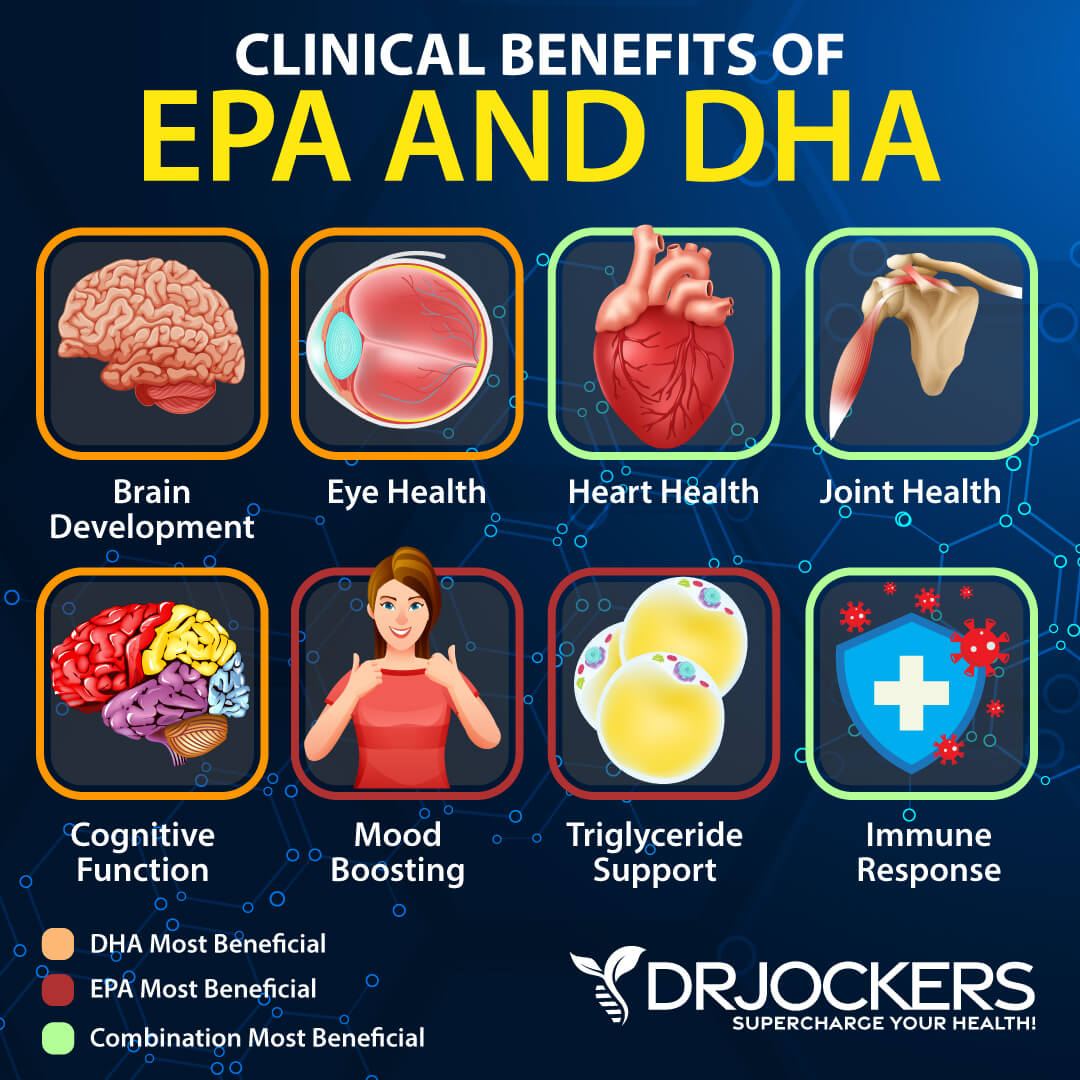
Support Glutathione Levels
Glutathione is our master antioxidant that regulates all other antioxidants within the body. Having high amounts of glutathione in the body is key for mitigating the inflammatory effects of free radicals.
Free radicals are upregulated during any time of stress whether it is lifestyle or something like a bacterial imbalance in the gut. Supporting your glutathione levels can reduce inflammaging and improve your muscle strength and function. Foods that contain glutathione include asparagus, broccoli, avocado, spinach, tomatoes, garlic, Brussels sprouts, tomatoes, cucumber, cabbage, walnut, and almonds.
For clinical applications, I will either use glutathione boosting agents like N-acetyl cysteine (NAC), liposomal or acetylated glutathione. These forms are the most effective for improving our bodies intracellular glutathione levels. To learn more about how to improve your glutathione levels, I recommend reading this article.
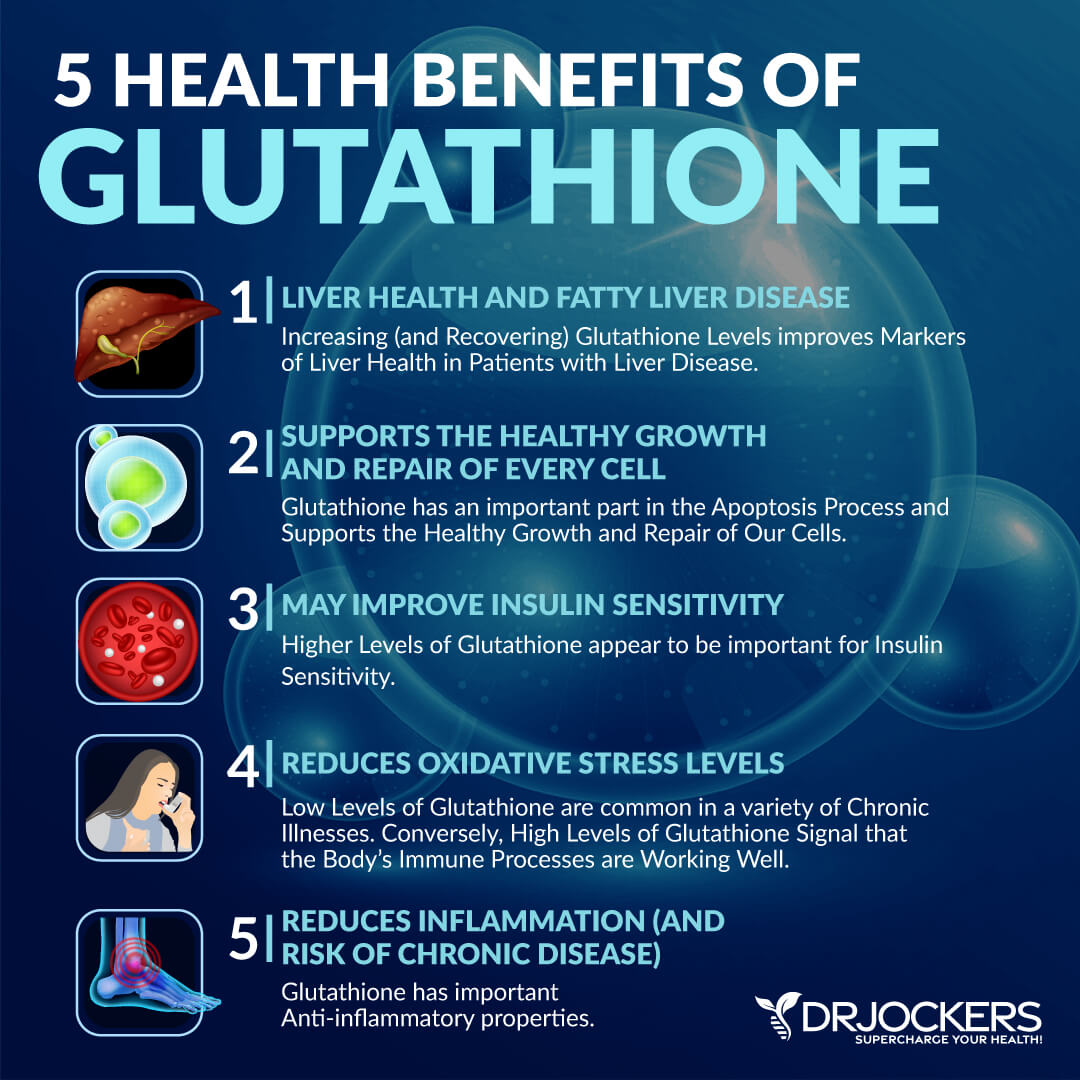
Use Herbs to Support Inflammation Levels
Finally, I recommend three powerful herbs that can support your inflammation levels: curcumin, resveratrol, and quercetin. Curcumin is the active ingredient of turmeric, one of the best research herbs for inflammation and pain. According to a 2016 systematic review and meta-analysis of randomized trials published in the Journal of Medicinal Food, curcumin is beneficial for inflammation and pain and can reduce symptoms of joint arthritis, a common problem in older people (23).
Resveratrol is a plant compound found in grapes, red wine, and certain berries with antioxidant benefits. According to a 2018 study published in the International Journal of Molecular Science, resveratrol offers anti-inflammatory benefits (24).
Quercetin is a flavonoid found in various plants with complementary benefits to resveratrol. According to a 2016 study published in Nutrients, quercetin offers benefits for inflammation and your immune system (25). To benefit from these fantastic herbs, I recommend Inflam Defense, my best supplement for inflammation.
Red Light Therapy
Red light therapy (RLT) is a powerful therapeutic technique and an alternative healing method. It uses red low-level wavelengths of light for a variety of therapeutic purposes, including wound healing, scars, and other skin issues, inflammation, pain, hair growth, and sleep quality (26).
One of the main reasons people use red light therapy is for its skin health benefits. A study on the benefits of the stimulating, repair, and skin benefits of RLT found that it may increase collagen production, fibroblast production, mRNA and circulation between skin cells. As a result, RLT may help skin elasticity and facial texture, reduce fine lines and wrinkles, and lower free radical damage (26).
Red light therapy may also help to treat acne. Just like sunlight it may reduce affect sebum production. However, too much sun exposure can be problematic because of the ultraviolet (UV) and UVB rays, making RLT a great option. Another study has found that it may improve complexion and the overall feeling of the skin, and help to rejuvenate skin cells (26, 27).
If you are looking for a high-quality red light therapy device, I personally use and highly recommend Mito Red Light Therapy Device. It is a third-party tested device with the highest power on the market. Use the coupon code DRJOCKERS at checkout to save 5% on the MitoRed product line.
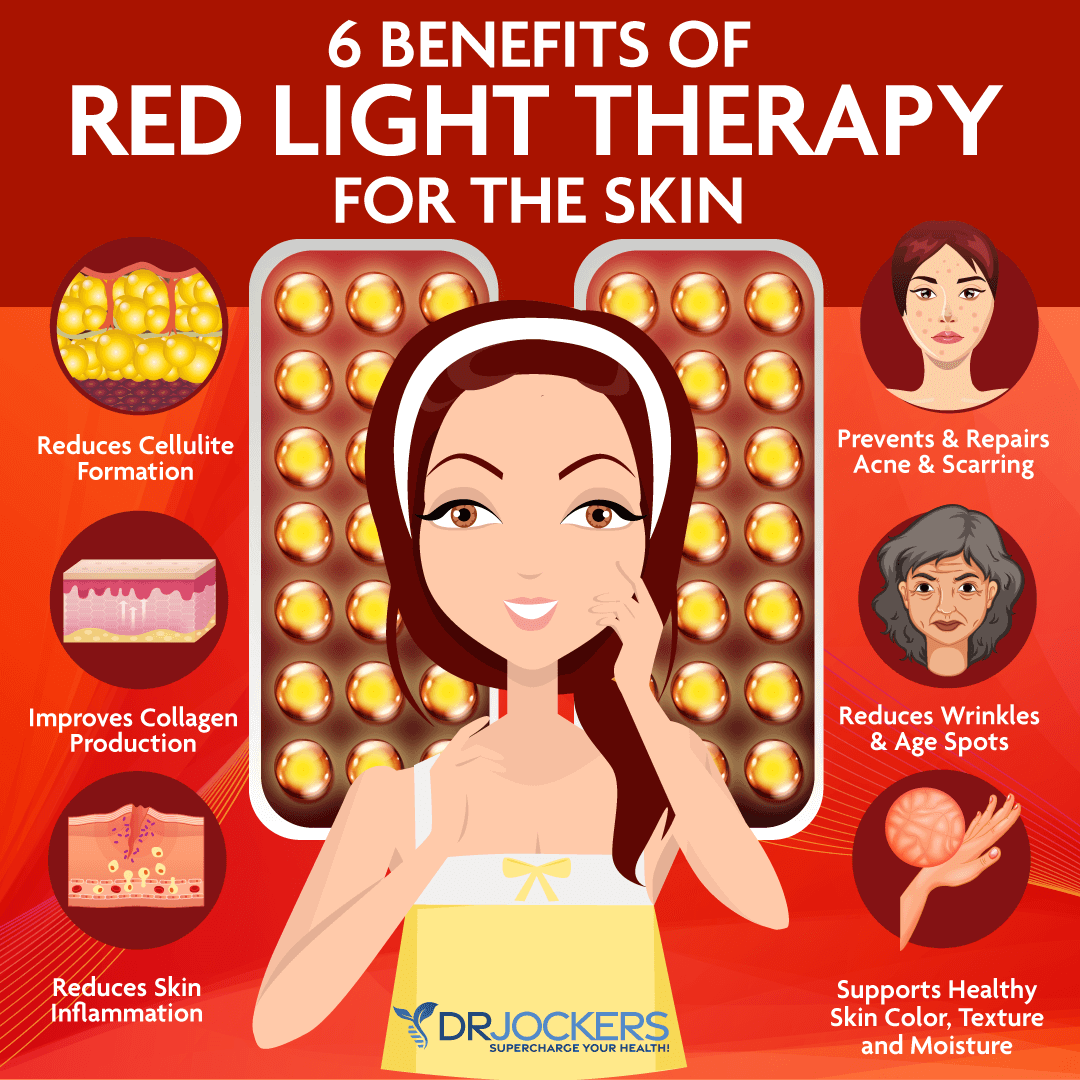
Red Light Therapy Face Mask
If you are looking for red light therapy benefits specifically for your face, I highly recommend this HigherDOSE Red Light Face Mask. It offers a functional cordless design, which is very convenient. You can use it anywhere in the house and take it with you on trips. It helps to rejuvenate your skin and may be great for acne scarring, scarring, fine lines, wrinkles, and your overall skin tone.
Even just one session can make you feel more rejuvenated and fresh in your skin. However, if you use it regularly, you may notice a visible difference in your skin. Less scaring, fewer fine lines, fewer wrinkles, and more importantly, a visible glow are among the potential benefits.
I highly recommend that you add using a HigherDOSE Red Light Face Mask to your daily routine. This is a great time for relaxation, meditation, and some well-deserved ‘me time’. Use the coupon code DRJOCKERS15 to save 15% off on HigherDOSE products including the Red Light Face Mask.
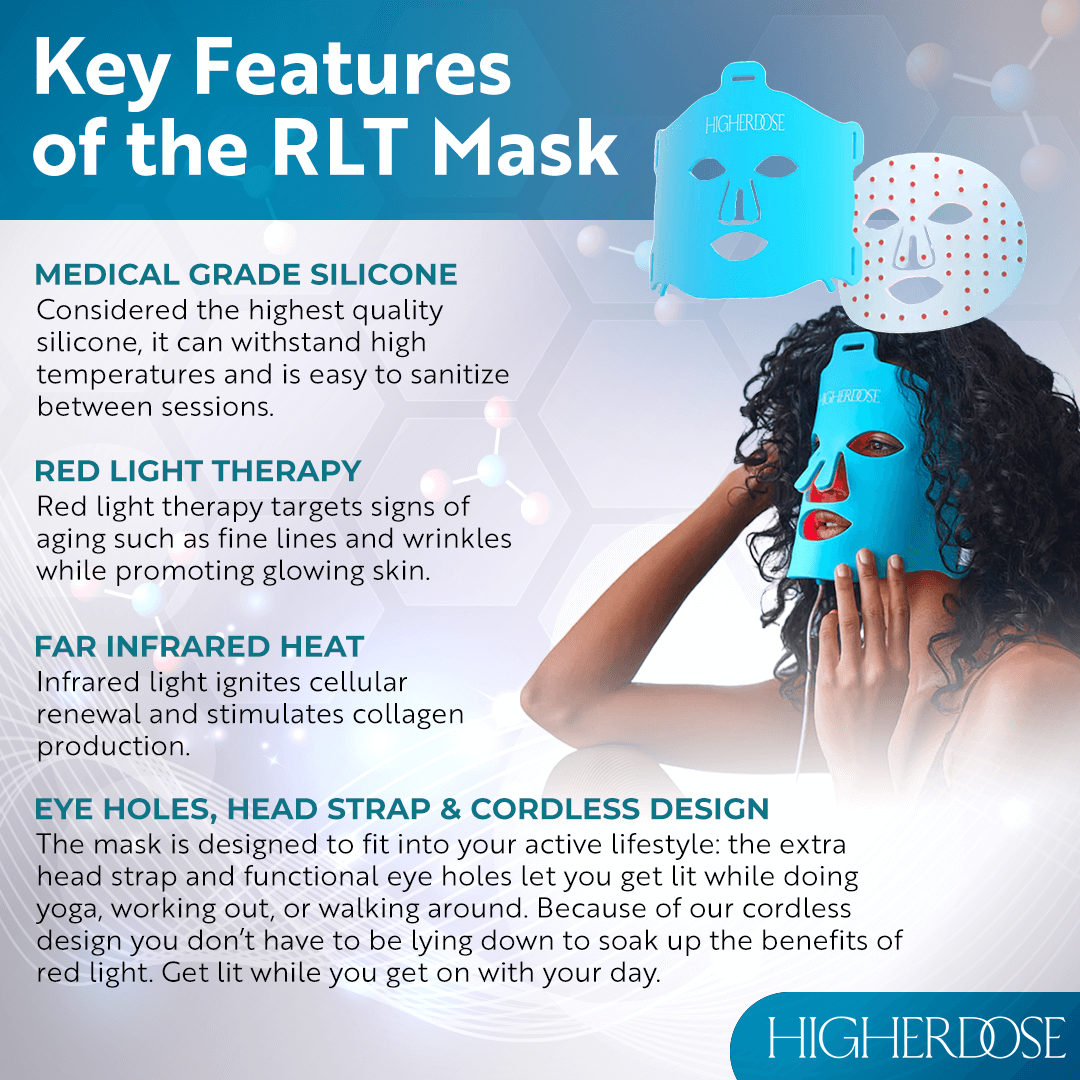
Final Thoughts
Inflammaging is a low-grade inflammation that develops with advanced age. It is the underlying cause of many age-related symptoms, ailments, and diseases. It’s time that you take your health into your own hands and reduce inflammation in your body. I recommend that you follow my top natural support strategies for inflammaging to improve your health and well-being through old age.
If you want to work with a functional health coach, I recommend this article with tips on how to find a great coach. On our website, we offer long-distance functional health coaching programs. For further support with your health goals, just reach out—our fantastic coaches are here to support your journey.
Inflammation Crushing Ebundle
The Inflammation Crushing Ebundle is designed to help you improve your brain, liver, immune system and discover the healing strategies, foods and recipes to burn fat, reduce inflammation and Thrive in Life!
As a doctor of natural medicine, I have spent the past 20 years studying the best healing strategies and worked with hundreds of coaching clients, helping them overcome chronic health conditions and optimize their overall health.
In our Inflammation Crushing Ebundle, I have put together my very best strategies to reduce inflammation and optimize your healing potential. Take a look at what you will get inside these valuable guides below!
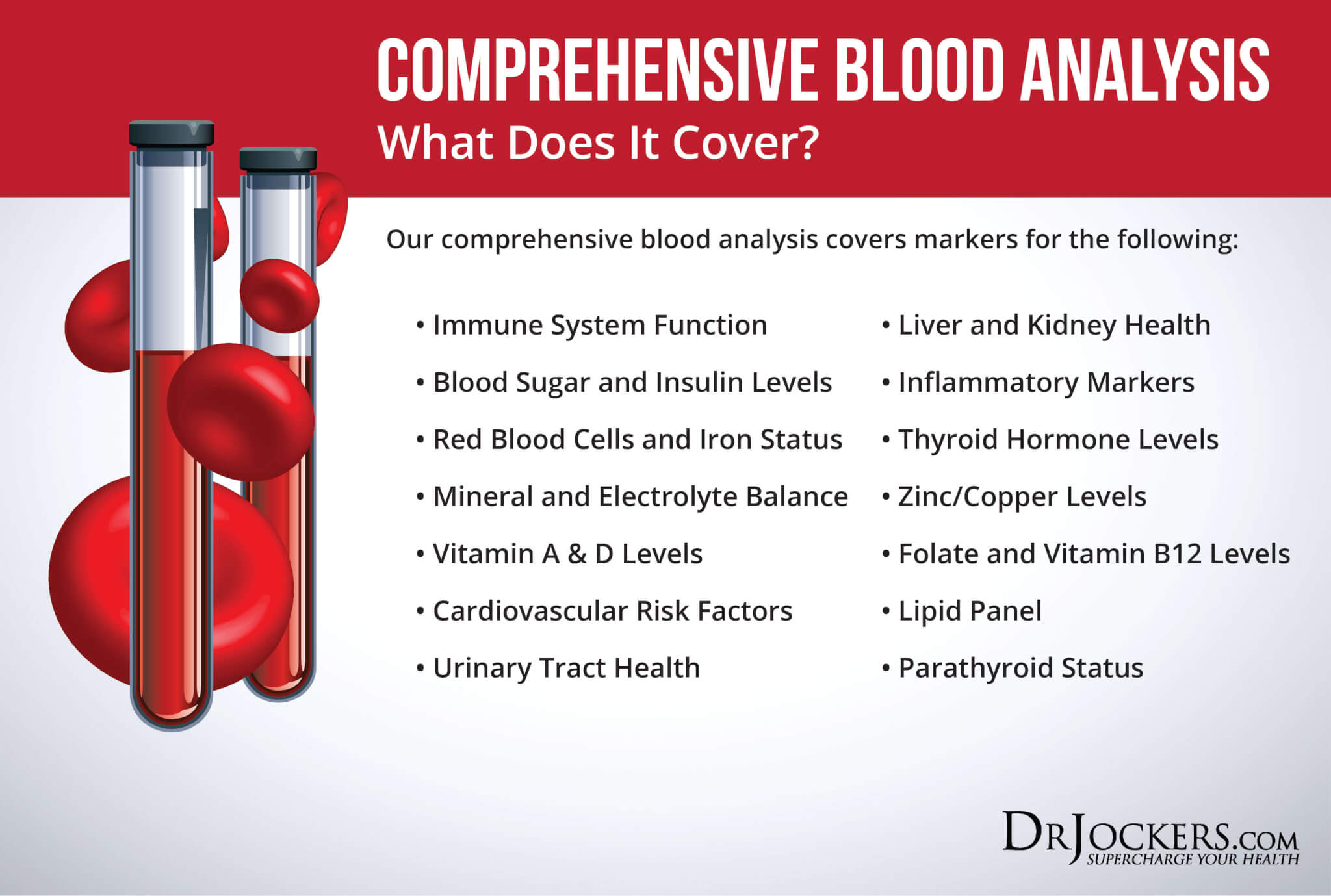





Under “Chronic Infections,” I would also add root canals (see https://drjockers.com/root-canals/) as an important source. I personally had three “unexplained” heart attacks, the first relatively mild one at the age of 54. The last one, nine years later was nearly fatal. All of them were apparently caused by inflammation in my heart arteries caused by the toxins excreted by anaerobic bacteria in an infected jaw bone above a root canal which was done at the age of 20 (34 years before my first heart attack). Neither of my two (now ex-) cardiologists ever thought to ask me, “Greg, have you ever had a root canal?” And my (now ex-) conventional dentist, who was aware of all three of my heart attacks and of course was also well aware of my root canal, never thought to check for an infection.
I was 20 minutes into my first visit with a holistic dentist when he showed me the x-rays he had just taken, with a large white spot in the jaw bone above the root canal. Knowing nothing about my history of heart disease, he said, “You had better have that dead tooth removed and the infection in the bone there cleaned out and cleared up before it causes you to have a heart attack.” I did some online research, learned that he was right, and had him do the job for me. It is now 10 years since my last heart attack and I no longer have any symptoms of heart disease. I credit that wonderful holistic dentist with literally saving my life by finding and fixing what was quite literally the “root cause” of my chronic inflammation.
Yes root canals and oral infections are a major source of inflammation. Thanks for sharing!
I read article for women top enemies are metabolism and inflammation. My thoughts are to tIe care of the thyroid, and everything else will fall n2 place. There so much. Control in the brain that reacts on how the thyroid is functioning.
The foods we eat are the desires from our brain that causes us to eat, the energy we have we will exercise on how we feel again the brain.
I lost lots of weight w mushrooms and herbs. I noticed when I lost 1st 10 pounds got more energy. The reason people can’t lose weight is parasites toxins that right to keep the fat, so we must go to war….
Thanks for sharing Christina! Blessings!
I have most of the symptoms of chronic inflammation, but what i dont have is weight gain. I’ve lost a considerable amount of weight over the yrs, as well as muscle mass and energy. Why is weight loss never mentioned?
Yes this is very common, it is muscle wasting from chronic inflammation. Be sure to follow the strategies in this article.
Great article! In the section on testing, you didn’t discuss homocysteine and the optimal levels for it.
Yes homocysteine is an important one and optimal levels are between 6-9.
I learned alot fro. This article and it motvated me to get started. Thank you!
Great to hear that Ruthy! Blessings to you!
Great and concise article. Thank you.
Outstanding, well-researched and comprehensive description of issues AND REMEDIES of our modern lifestyle. I plan to give my integrated primary care physician and my naturopathic doctor a copy, as well as one for myself. Bravo–keep up the good work!
This is a fantastic article. Thank you. I have cited it in this article: Essential Oils For Inflammation
https://www.wilddigital.co.uk/essential-oils-for-inflammation/
Great thanks Rachel!
Very comprehensive article, most of which I’ve been aware of. The one thing I wish was included is the fact that Magnesium is very anti-inflammatory and deficient for most of us. It is critical to metabolizing vitamin D which is very important but must have Mg to convert from the storage form to the active form.
Yes absolutely, we discuss that in great detail in this article on Vitamin D Resistance: https://drjockers.com/vitamin-d-resistance-and-autoimmunity/
I am so grateful for this article. I have bone marrow damage due to chemo and have been intermittent fasting and eating fermented foods. Kefir and sourdough bread are two of them. Can you tell me if the organic wheat and milk I use are ok even though it’s dairy and grain? I feel so much better since I started consuming them as well as Kambucha and kimchi. My hemorologist says there is really nothing I can do to improve my white and red cell count. I would like to be your Guinea pig!!!!!
Sorry to hear about your health challenges Julia! I would not recommend consuming wheat and dairy as most people with these issues struggle with food sensitivities here. I would recommend reaching out to one of our functional health coaches: https://drjockers.com/functional-nutrition-tips-to-find-a-great-health-coach/
All of this information is very interesting. I have most of these symptoms, have bern diagnosed with fibromyalgia, and my digestive system is such a mess that any supplement I try to take gives me instant diarrhea. I am also retired and on a fixed income. All of these suggested remedies are so expensive that it seems good health is only available to those who are wealthy. Even eating only organic and grass fed foods are so expensive! It’s very discouraging and frustrating.
I also have had my gallbladder removed and read an article that said someone without a gallbladder should never do intermittent fasting. What is your opinion on that?
Thanks.
This is a wealth of information, Dr. Jockers, and I am grateful that you put the time and effort into researching and sharing it with us! However, the odds of us regular people being able to accomplish most of these things are very low given lack of options and income. If one buys the best quality one can afford, one continues to go hungry because it doesn’t amount to much. I acknowledge that exposure to EMFs can be harmful, but all communication systems are or have already (unless one lives in a remote rural community) been changed to VoIP and if one wants to communicate one has no choice but to go along. The System (government, monopolistic food, pharmaceutical, and health care corporations) simply doesn’t favor the average person monetarily or in choices.
I guess if a person was rich and could live on a remote island off the grid and grow and harvest their own, they would stand a better chance than the majority. But it’s nice to dream. And because we as average humans do possess a fair level of tenacity, we’re apt to keep trying.
Dear Dr.Jockers I can’t thank you enough for your training and equipping so many of us. This is so thorough that all we can do is cause and effect…and KNOWING the pieces of the puzzle is critical . I value your charts. I learn by seeing and they speak loudly and put the pieces of the puzzle together…I am all the richer and wiser. I am in ministry and I hope to help people daily with body , mind, and Spirit. You equip me for myself and through me others ! I can send these along to others ….I have special files, of your topical materials. and you are a good teacher. and we have alot to learn from you . I also am limited in my finances but I can learn in the best college classroom from you……..Thank you for all that you give trying to equip people with the TRUTH. that can set captives free. I have gained soo much from this. Thank you again and again.